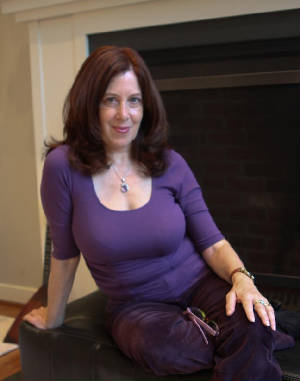
|
| That's me, Pattie Weiss Levy. |
A Modern-Day "Ima" on a Modern-Day Bimah
(With
new content posted every WEEK!)

|
|
Thursday, February 23, 2012
A Word From the Weiss
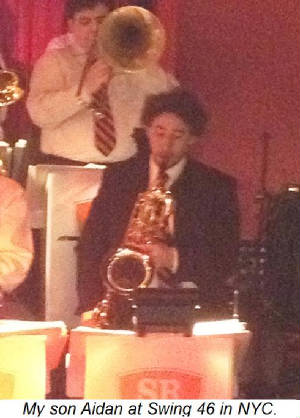 Sorry for posting a little late this week, but I had to go to New York to see my son perform and for another
creative adventure that I may write about next week. Sorry for posting a little late this week, but I had to go to New York to see my son perform and for another
creative adventure that I may write about next week.
When you’re the
mother of children who perform – and I happen to have two of them – you end up inviting your friends and family
to performances all the time. At least people I know probably feel like I invite them all the time. The fact is that
I hesitate to invite almost anyone to almost anything involving my kids. I don’t want to seem like a stage mother. I
don’t want to appear self-absorbed, pushy or presumptuous. And I don’t want these people to ever feel obligated
to come if they don’t truly want to.
When people invite me to see them or their kids perform, you see,
I feel obligated to attend (as I did last week when my friend Jesse asked me to attend a doggie fashion show in which her
teacup poodle, Olivia Bianca, walked the, uh, catwalk). It’s not just because I genuinely want to go (although I usually
do), but also because I know how they probably feel. After all, I’m the mother of children who perform.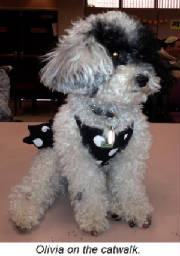
So I felt a little torn when my daughter asked us to help recruit an audience for a crucial gig she had last
weekend. Allegra had been hired to appear for the first time at Tomi Jazz, a small club on East 53rd Street in Manhattan.
She’d been attempting to get booked there for months and was convinced that if she drew a sizable crowd, they would
hire her to sing there regularly. Sure, she’d invited plenty of her own friends too, but Tomi charges a $10 cover plus
a $10 drink minimum, and she feared that these sums, however nominal they were for more mature adults, would prove
prohibitive to the younger set.
She also had another motive for trying to drum up a crowd. Tomi didn’t pay much,
just $150 in total for Allegra and the two musicians who would accompany her, she said. But she believed they’d receive
$5 more for every guest beyond the first 20 to show up.
So I felt a mixture of mild annoyance and enormous relief when Nice Jewish Dad instantly sprang into action
and sent out invites to many of his own friends and business associates. My relief was that now I wouldn’t have to bother
anyone myself. (Personally, I wasn’t convinced it was worth haranguing everyone I’d ever met so that my daughter
might reap an extra 20 or 30 bucks.) My annoyance was that I’d been to this club with her once before
and knew that it was tiny. I mean TINY! I was worried that my husband would pressure a multitude to show up, then they’d
come and have nowhere to sit.
I also worried that they would find somewhere to sit, and that somewhere would
be next to me. After all, when people turn out to support your kid, you feel obliged to spend a reasonable amount of time chatting with them and making them feel welcome. And the truth is that
when my kids are performing, I don’t really want to make the rounds as if I were at their bar or bat mitzvah. Of course,
having friends there makes it even more special. Still, when Aidan is playing the sax or Allegra is singing, I’d really
rather sit quietly and listen to them play or sing. feel obliged to spend a reasonable amount of time chatting with them and making them feel welcome. And the truth is that
when my kids are performing, I don’t really want to make the rounds as if I were at their bar or bat mitzvah. Of course,
having friends there makes it even more special. Still, when Aidan is playing the sax or Allegra is singing, I’d really
rather sit quietly and listen to them play or sing.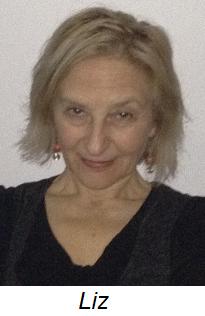
So I only invited two people myself -- my good friend Liz, who is subletting an apartment in NYC and always
comes to Allegra’s gigs, and my college roommate Hallie, who lives in NYC but is very busy with her own kid and had
never seen Allegra perform. Hallie responded that there were complications, but she'd make it if humanly possible.
The morning before the gig, my brother mentioned that he also was going to be in New York that night, to see a play
written by the husband of a mutual high school friend. That made me feel a bit foolish that I hadn’t invited him to
hear Allegra. Then again, he’d gone all the way to Boston to see her sing not that long ago. Also, my impression is that, although he lives on Long Island, he loathes going into the city on
weekends and rarely if ever does. sing not that long ago. Also, my impression is that, although he lives on Long Island, he loathes going into the city on
weekends and rarely if ever does.
At the same time, I felt a little surprised that no one had mentioned this play to
me. I’m as avid a theatergoer as you’ll find anywhere, and as someone whose kids perform, and who writes and performs
a little herself, I make it a point to support all of my friends’ creative efforts. Plus, we’d seen another play
by this friend’s husband, Rob Ackerman, called Tabletop, back in 2001, and absolutely loved it.
So we decided to go into the city that night and see the show then ourselves. We hadn’t found anywhere
to stay yet, though, and this now meant that we needed a hotel not just for one night but two. I hadn’t waited until
the last minute to book one because I’m disorganized. I’d deliberately delayed because the rates usually drop
precipitously just before the weekend. But sometimes this strategy comes back to bite me in the tush. And so it was
last week. Instead of plummeting, the prices had started out astronomical and then gone precipitously up.
Normally during the winter, rates become so reasonable that it’s tempting to visit the Big Apple despite the snow
and bitter cold (two bullets that we miraculously dodged this year). But last week, there was nothing close to affordable.
What the heck was going on -- Fashion Week? A convention? Surely there was no marathon being run in February. Finally,
my son explained it to me. It was President’s Day on Monday, and everyone was flocking to NYC for the three-day weekend.
Oh! Right. But where, then, were we going to spend our two-day getaway?
Then suddenly I found the proverbial needle in a haystack -- an actual bargain. Not just cheap. Dirt cheap! The Jane Hotel.
For only 99 bucks a night. OK, they say that you get what you pay for, and here's what we’d be paying for: a teensy-weensy
room (and I use the word "room" loosely; you'd be better off thinking "closet"), equipped with bunk beds...
and not much else. We would use a shared bathroom down the hall.
That may be fine for youth hostels. But my husband
and I are not young. Far from. Nor are we hipsters, like the huge crowd of attractive, stylish, 20-something club-goers we
would have to wade through late at night just to get through The Jane’s front door.
So before booking the place, I asked my husband to study the photos on the Web site and tell me
whether he was willing to rough it to that extent. He looked at the bunk beds. He looked at the bathroom we’d share
with multiple strangers. He said that he was game.
Unfortunately, it took us so long to pack that we got stuck in endless
rush-hour traffic. So there was no time to check into the hotel. We had to go straight to the play.
Yet I’m not complaining. We LOVED
the play. (Those three people in the front row who leapt up to give a standing O -- that was us.) A comedy entitled Call
Me Waldo, it focuses on how the life of an ordinary electrician begins to unravel when he finds himself channeling the
spirit of Ralph Waldo Emerson. We brought our friend Liz, who also sees a great deal of theater, and all three of us found the
production to be poignant, appealing and extremely moving. Best of all, the characters were believable and highly sympathetic,
each in his or her own way... and the messages at the core really spoke to us.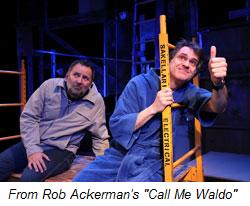
I guess that, like Rob, its writer, I’m at an age now at which I recognize the fragility of life and worry frantically
about my children. I also question who I am, what I've managed to accomplish, and to what extent my spouse genuinely loves,
respects and admires me. Liz also remarked how refreshing it was to see a love story of sorts that focused on ordinary folk
of our own vintage, rather than the usual picture-perfect 20-somethings. We all left feeling extremely upbeat, too much of
a rarity these days.
Afterwards, having missed dinner, we repaired to a new place we were dying to try. This past
summer, we ate what is reputed to be THE best pizza in the world in Italy, at a little café in Naples
called Starita. We learned there that the owner was opening a branch in Manhattan, scheduled to debut this past October.
But that branch never sprouted... until early last week.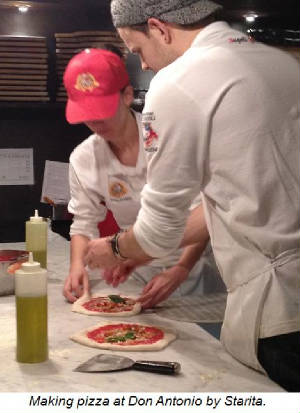
Normally, we’re not pizza eaters – we can go a whole year without having a slice. But the pizza in Naples
is nothing like the typical pies we know and love in the States. It’s so good, fresh and ethereally light that while
in Italy we ate it almost every night.
And now we discovered, to our delight (and the likely demise of my nice Jewish girlish figure),
that our pizza consumption was about to expand. Because nothing has been lost in translation. What this new place serves up
is just as good as the original. Only here the ambience is stylish and trendy. (The Naples eatery isn’t big on
atmosphere. Just pizza).
The New York one is called Don Antonio by Starita, and it's at 309 West 50th, just west of 8th Avenue. Being something
of a purist, I went for a plain Margherita pie, topped with fresh mozzarella and a few sprigs of basil, although of course
they have countless delectable toppings and specialty combinations too. As with the pizza in Italy, you eat an entire pie
here yourself. The crust is so soft, chewy and thin that it's irresistible and easily devoured. The salads are remarkably
fresh, too. We tried the Toscano, with crisp fresh pears, goat cheese and toasted walnuts. (In Naples, they have no salad...
just pizza.)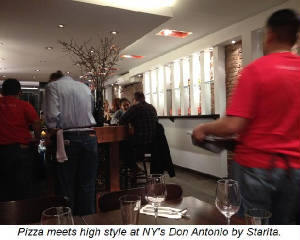
Unfortunately, when I introduced myself to the manager, Robert, and told him of our adventures in Italy, he sent us
over the house special dessert... tendrils of crisply fried pizza dough smothered in warm Nutella. They didn't have that in
Napoli, either. (Just pizza.)
Finally, it was time to check into our hotel. By the time we’d walked back to our car
and driven down to the West Village, it was nearly 1 a.m. I waited in the car while my husband made his way through the throng
out front and checked in. Moments later he returned and motioned for me to roll down my car window.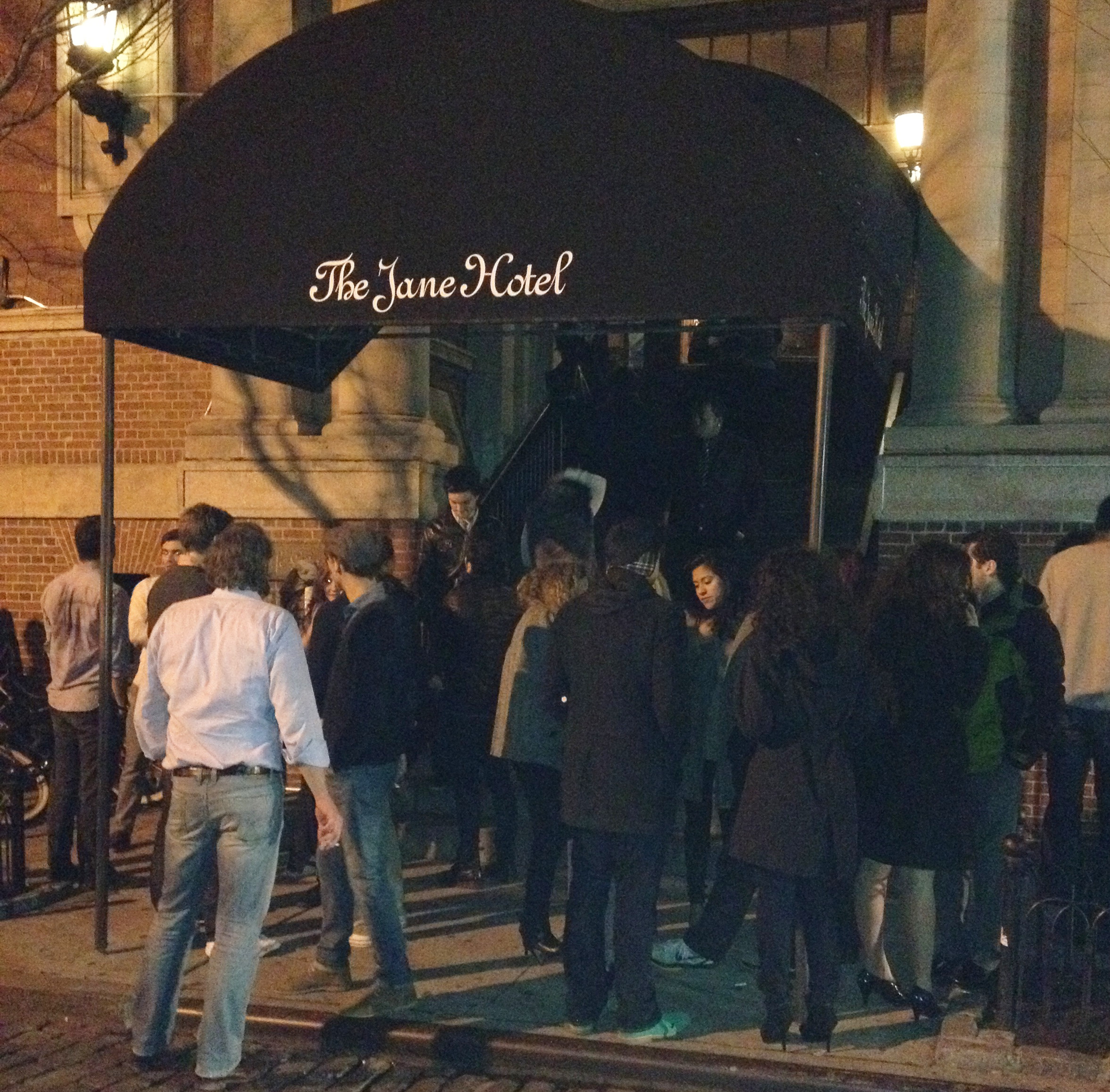
“Do you think you can get us out of our reservation for tomorrow?” he asked flatly. “Because I’m
not staying here for two nights.”
While he drove off to find a parking space, I went in myself and learned the reason why this
hotel is rightfully called The Jane (beyond the fact that it's located on Jane Street). At first I thought the entire place
smelled foul. Then I realized what that scent was – permeating the elevator from which five young guests emerged, lingering
in the upstairs hallways and wafting out of many a room. The place had the distinct aroma of what is often called Mary Jane.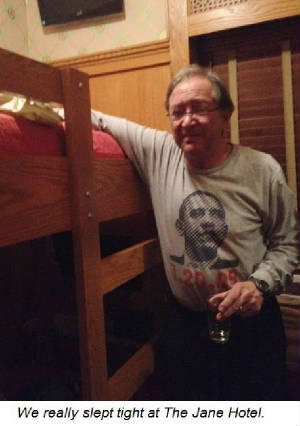
The young woman in vintage bellhop garb at the front desk assured me that we could cancel the
next night if we let them know by noon. Upstairs, I entered our room (by which I mean closet, although maybe you should forget about closets, since it had none) and saw
that it brought to mind those efficiently designed compact compartments you find on overnight trains. It was only as long
as its two stacked twin-sized beds (just over 6 feet) and offered less than 3 feet of space between those beds and the wall.
Then again, if you don't bring much luggage, how much space do you really need? The beds were reasonably comfortable,
and each was equipped with its own flat-screen TV, giving it the feel of an airplane seat. As for the bathrooms, there were
two on each floor with ultramodern fixtures, each equipped with two toilets, two sinks and two shower stalls with locking
doors. All of these public restrooms were unisex, so we found ourselves getting rather intimate with complete strangers very
quickly. Then again, you use public restrooms when you're in a restaurant, mall or a plane. Why not in a hotel?
The next morning, my husband was shaving when a woman stepped out of the shower with a towel on her head
and another draped around her shoulders. Nothing below the waist. "Good morning," she said nonchalantly. Made his
day. OK, so it wasn't the most elegant hotel experience we've ever had. Maybe it was the least. But in NYC, I'd rather spend
my money on food, theater, and shopping. And The Jane's environs, the Meatpacking District, are prime turf for the first and
last of those activities. We’d slept fine. It was a real adventure. So my husband reconsidered. “Let’s
stay,” he said.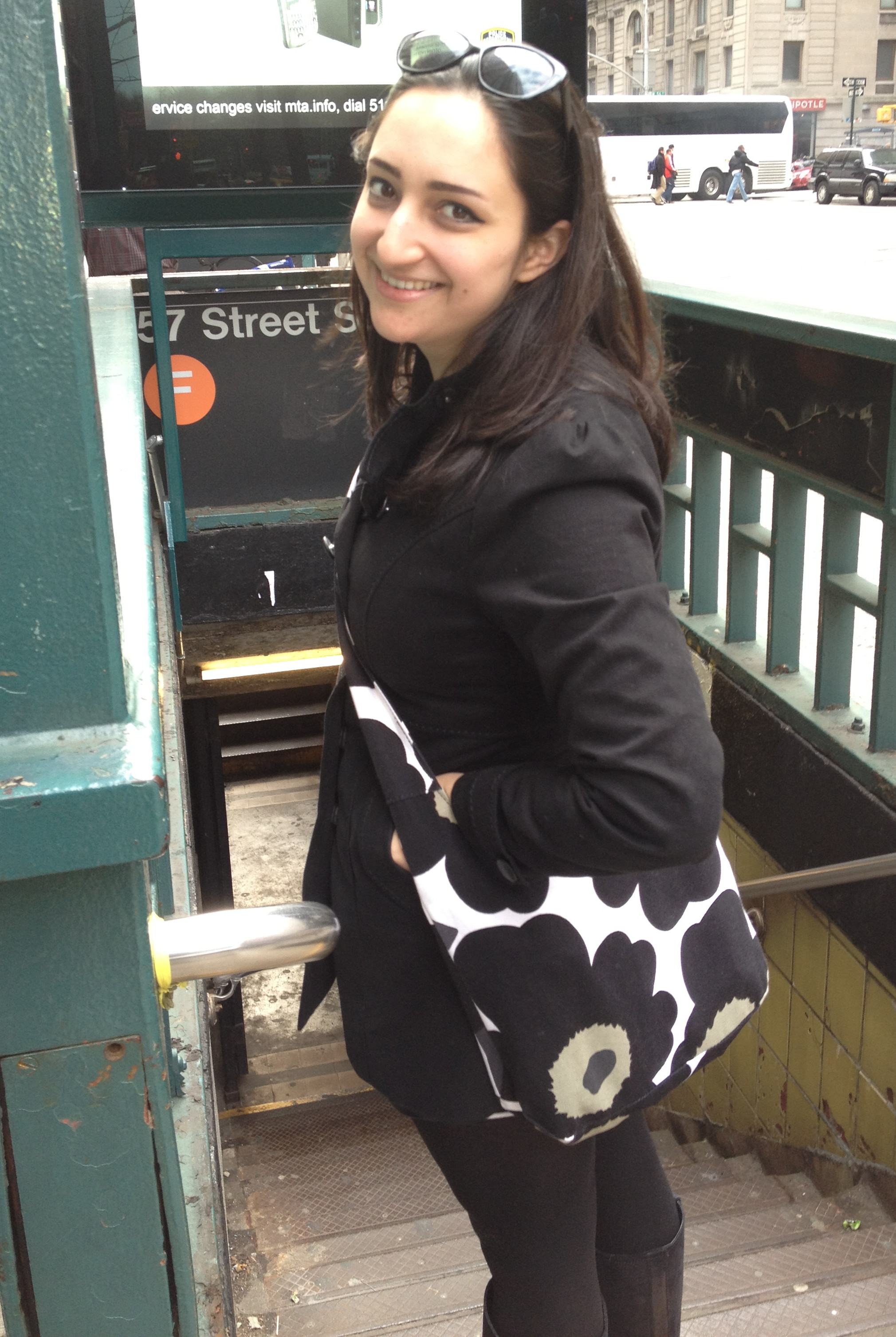
We’d hoped to spend the day with our kids, but Aidan was feeling under the weather and said he would
see us at the restaurant that night. So we met Allegra for lunch near the Museum of Modern Art. Then she had a rehearsal,
so we walked her to the subway. En route, we saw a strange young man dressed like Edward Scissorhands. She told us that he
was a harmless character who often wanders the streets in costume, plying tourists for tips in exchange for having their photo
snapped with him. But when he abruptly snuck up behind her, she screamed.
“Your folks say it would
be OK if you went out with me,” he said to her in a peculiar voice.
My husband grimaced at him, looking
dubious. “Are you working or in medical school?” he asked.
“Edward”
shook his head sadly.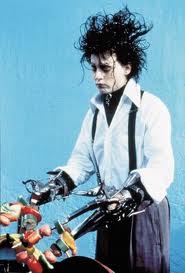
“Never mind that. Are you Jewish?” I asked.
Splaying
his arms and scissor-fingers akimbo, he shook his unruly mop of curls apologetically again.
“Then thanks,” I said,
“but 'fraid not.” Allegra, looking unmistakably relieved, made a beeline for the F train just in case.
After she’d left, we realized that we had nothing to do for the next few hours. We considered visiting MoMA.
But it was mobbed, as usual, and admission is pretty pricey. If we were economizing so much on the hotel that we
were sleeping in bunk beds and showering with strangers, did we really want to shell out 50 bucks to look at art?
Then I had an idea. An artist friend
had recently taken me to visit the posh art galleries on 57th Street,and admission to them is free. These aren’t visible
from the street, but my husband happened to have a copy of The New Yorker, which listed one in a nearby building,
where we discovered galleries on every floor.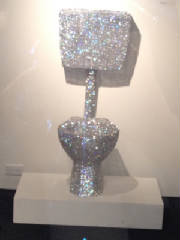
So we spent the next few hours looking at art. Or should I say “art.” In one gallery, we found
a toilet encrusted with rhinestones (talk about sitting on “the throne”). Another had a colorful chair that was
almost the spitting image – make that the sitting image – of my husband. But the one work that really
managed to catch my attention was something different and truly beyond. Actually, more like Bed, Bath & Beyond.
At first, seeing it sitting on the floor near an empty corner, I thought it was just an ordinary pair of pillows.
I figured that a child had been in the gallery, perhaps playing on the floor, and no one had picked them up yet. Then I realized
that this was actually a sculpture cast from some sort of hard, sparkly material made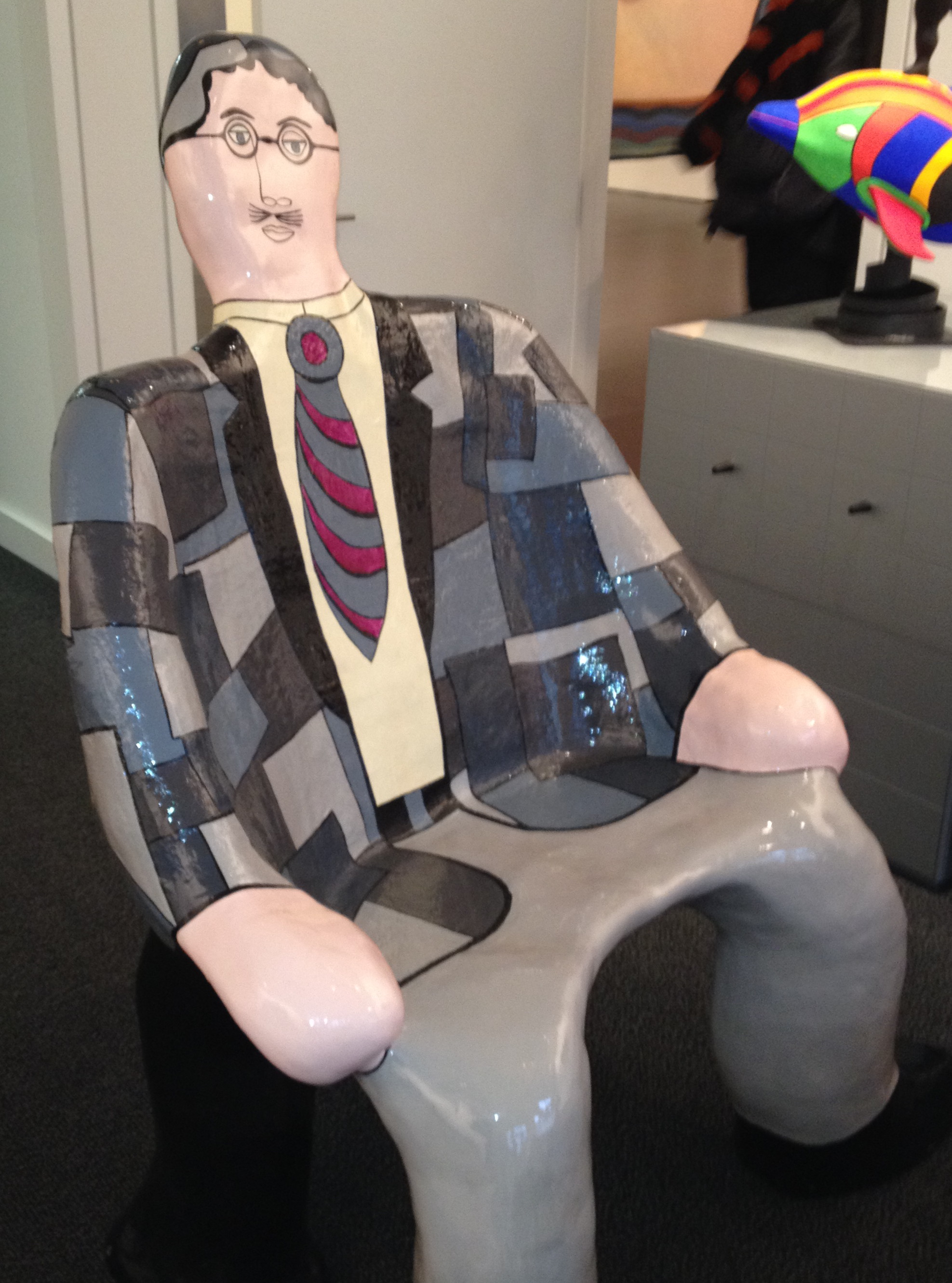 to resemble a white satin neckroll with a glistening white throw pillow tossed on top of it. After hours of looking, my poor
feet ached and I was so ready for a nap that I was tempted to lie down and rest my head on it. to resemble a white satin neckroll with a glistening white throw pillow tossed on top of it. After hours of looking, my poor
feet ached and I was so ready for a nap that I was tempted to lie down and rest my head on it.
Apparently, my husband had reached
the same state of exhaustion, because he went over to admire it, then asked the stylish woman working in the gallery what
it cost. She said that she would check the catalog for us, but she was fairly sure it was 80,000.
“Eighty thousand… lire?” my husband asked jocularly.
“Dollars,” she replied
drily. “And that doesn’t include delivery.” Evidently, it was a work by a rather well-known artist, although
the artist’s name was not well-known to me. We departed rather abruptly after that.
“Never mind,” I told
my husband when we were safely inside the elevator. “Let’s just throw a couple of actual pillows on the floor.”
And suddenly we had that “I think I drive the same car as a hip-hop music mogul because I'm feeling richer”
effect. Which was a good thing, considering what was about to happen at the jazz club.
At last it was time to go over
because we were meeting Aidan for dinner there first, in order to make sure that we got good seats for the show. When we’d
called to make a reservation, they had assured us that they served food. But now we discovered that most items on the menu
sounded strange. Make no mistake: I’m a major fan of Japanese food and could happily subsist on sushi alone. But
there was no sushi on this menu. Nor teriyaki, tempura, or much else remotely familiar. Try instead vinegar marinated jellyfish,
Spam rice balls, and “Doria Milanese,” which sounded intriguing until I read that it was “oven-baked ketchup
flavored rice with white and meat sauce.” Seriously, I mean – try them.
I finally settled on Sautéed Udon, which sounded safe enough, being described on the menu as rice
noodles with shrimp and vegetables, only to be served a gelatinous mass of gooey, worm-like pasta topped with cabbage and
sliced Vienna sausages instead. Oh, well. That’s what I get for ordering trayf (non-kosher food like
shellfish).
As showtime approached, more and more people we knew began to arrive – Liz, my husband’s business
associate, many of Allegra’s friends, and their friends, and her boyfriend’s Uncle Michael and his partner, Paven,
whom we had never met. Each made something of a grand entrance because for some reason Tomi keeps its front door locked,
and you can only get in by ringing a doorbell that sounds off loudly. Which continued to happen repeatedly even after the
show commenced.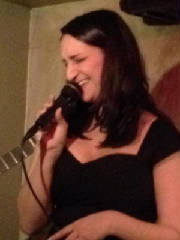
This annoying bell proceeded to go off during every song, drowning out the words. “Moon River, wider
than a (ding dong!), I’m crossing you in style, some (ding dong!)…” I found it beyond exasperating to have
my daughter’s mellifluous voice upstaged by these shrill chimes. But Liz said that it embued the place with an air of
exclusivity, as though we were in a private club. Besides, I wasn’t at all annoyed when it rang one more time, and in
walked… Hallie!
Also, this helped call attention to how many people actually were arriving. And I do
mean many. I was a bit offended when my husband’s business associate left after the first set (though he later wrote
to explain that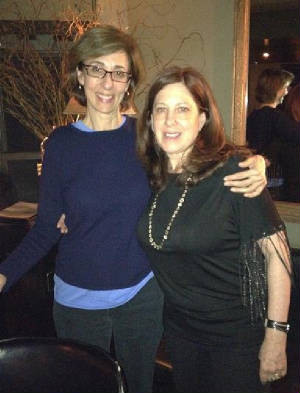 he needed to make a train back to New Jersey). But it was also a relief, because we desperately needed his table for the
next entourage to arrive. he needed to make a train back to New Jersey). But it was also a relief, because we desperately needed his table for the
next entourage to arrive.
In fact, nearly 40 customers had crowded in by the end, filling the premises and far
exceeding that base number of 20, beyond which she would get paid an additional fee. So it was an enormous disappointment
when the show ended to thunderous applause, then Allegra learned that the band was getting paid a total of $100 (not $150),
with nothing extra added in. She somehow had misread the contract, she explained.
Hearing this, I was heartbroken
on her behalf. We had dropped $100 for my husband, son and myself alone, and Allegra’s food had cost another $25. (They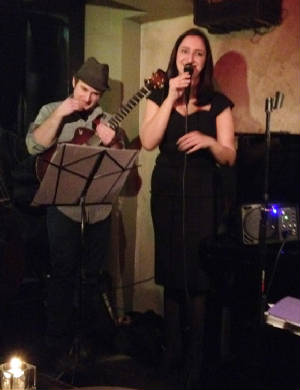 didn’t even feed the band for free, which is standard at most gigs.) Seeing how distraught she was, the manager came
over and slipped her another $30 that she would share with her accompanists. Still, between food, drinks, and the cover charge,
the club had easily netted over $1,000 from her show. Hallie was so outraged to hear this that she declared that she wasn’t
going to leave a tip. But as she was preparing to leave, our waitress approached her peevishly. didn’t even feed the band for free, which is standard at most gigs.) Seeing how distraught she was, the manager came
over and slipped her another $30 that she would share with her accompanists. Still, between food, drinks, and the cover charge,
the club had easily netted over $1,000 from her show. Hallie was so outraged to hear this that she declared that she wasn’t
going to leave a tip. But as she was preparing to leave, our waitress approached her peevishly.
"You left me nothing,” she said
to my friend pointedly.
“Excuse me?” Hallie asked.
“Where is the tip? You left
no tip,” the unabashed young Japanese woman bluntly persisted.
Evidently, chutzpah knows no cultural bounds.
But all of these concerns were easily outweighed
by the incomparable joy of hearing my daughter sing. For even though during the break I got to schmooze plenty with Hallie,
Liz, Uncle Michael, Paven, the business associate and more, I mostly did get to just sit and bask in the sweet strains of
her voice. And I realized in the end that she wasn’t really doing this for the money, anyway. She was singing for the
sheer pleasure of it. She was singing for me. She was singing for us. She was singing for herself and everyone she knew who'd been
kind enough to come.
And the more people who were there, the more that it was worth her while. It almost made me wish that I had invited a bigger
crowd. Then again, maybe it’s a good thing I didn’t. The club (which, unlike Allegra, made out like a bandit)
has already asked her back. So there will be a next time. And I’ll be calling people to come. Many people. Maybe even
you.
Feel no obligation. Come only if you wish. But I have to ask.
After all, I’m the mother of children who perform.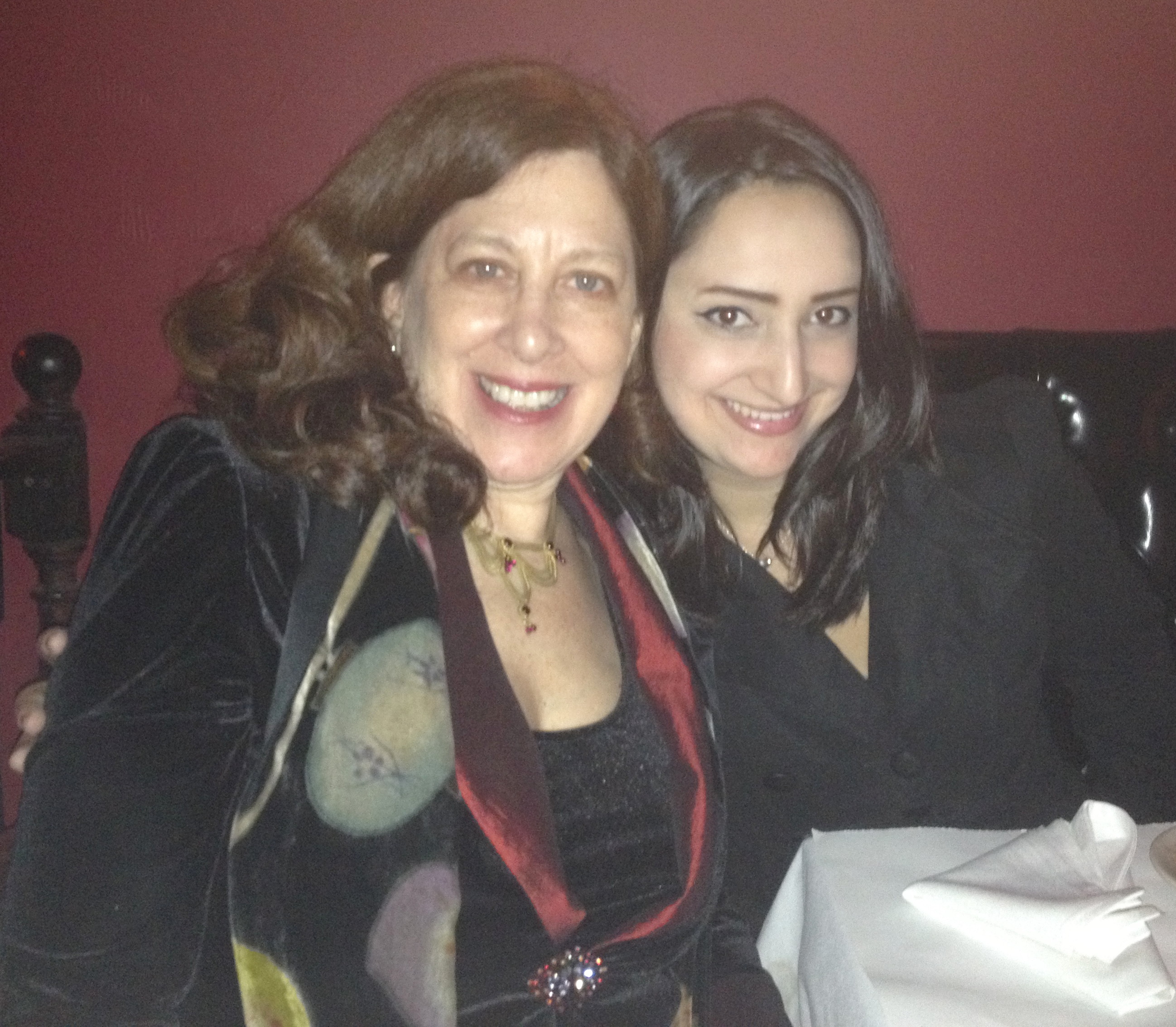 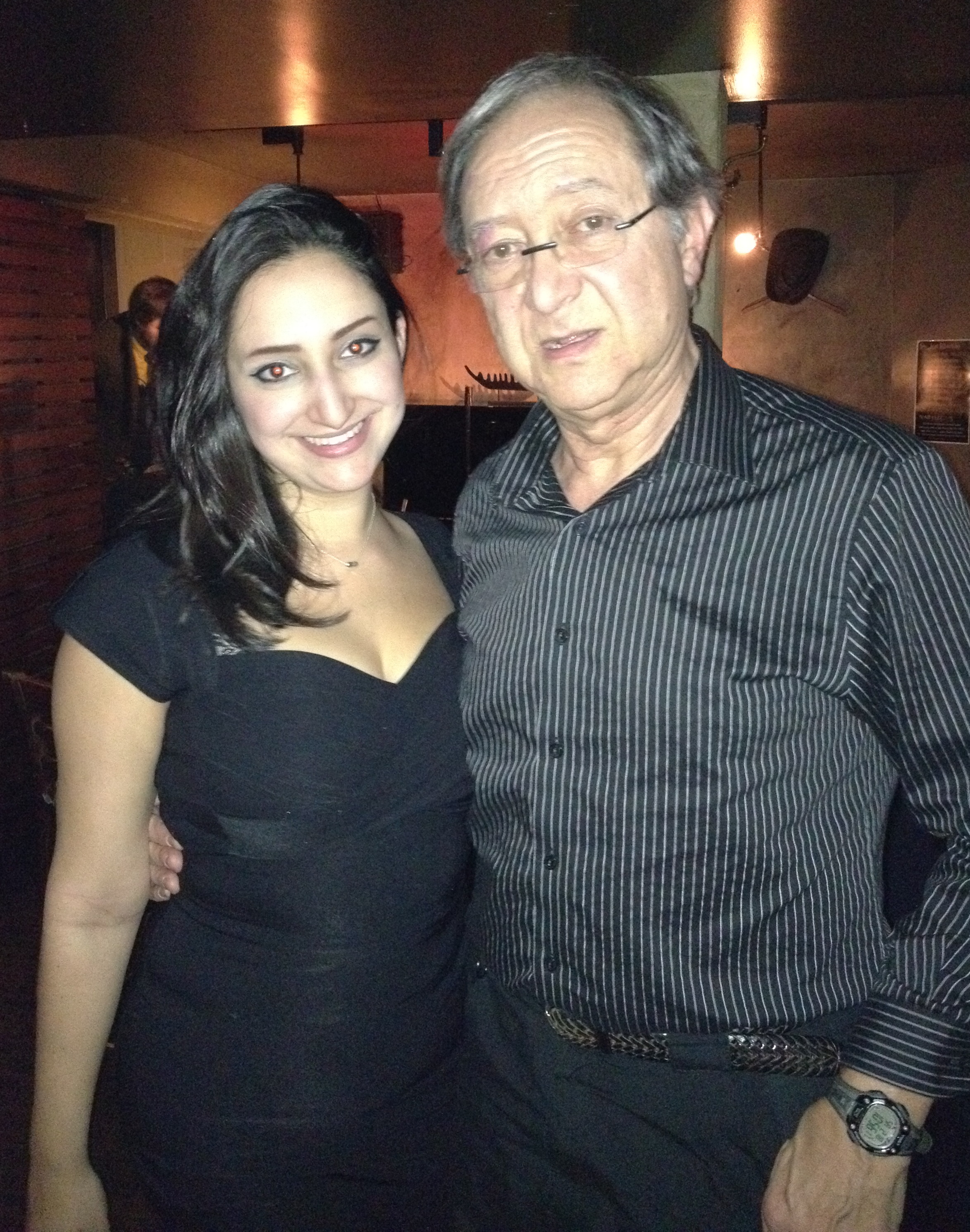
To hear Allegra sing
"Moon River" at Tomi Jazz with the occasional doorbell, click on this link (and sorry the video's so fuzzy;
I shot it on my iPhone):
http://www.youtube.com/watch?v=eMkDS-GauOw
12:31 pm
Wednesday, February 15, 2012
A Word From the Weiss
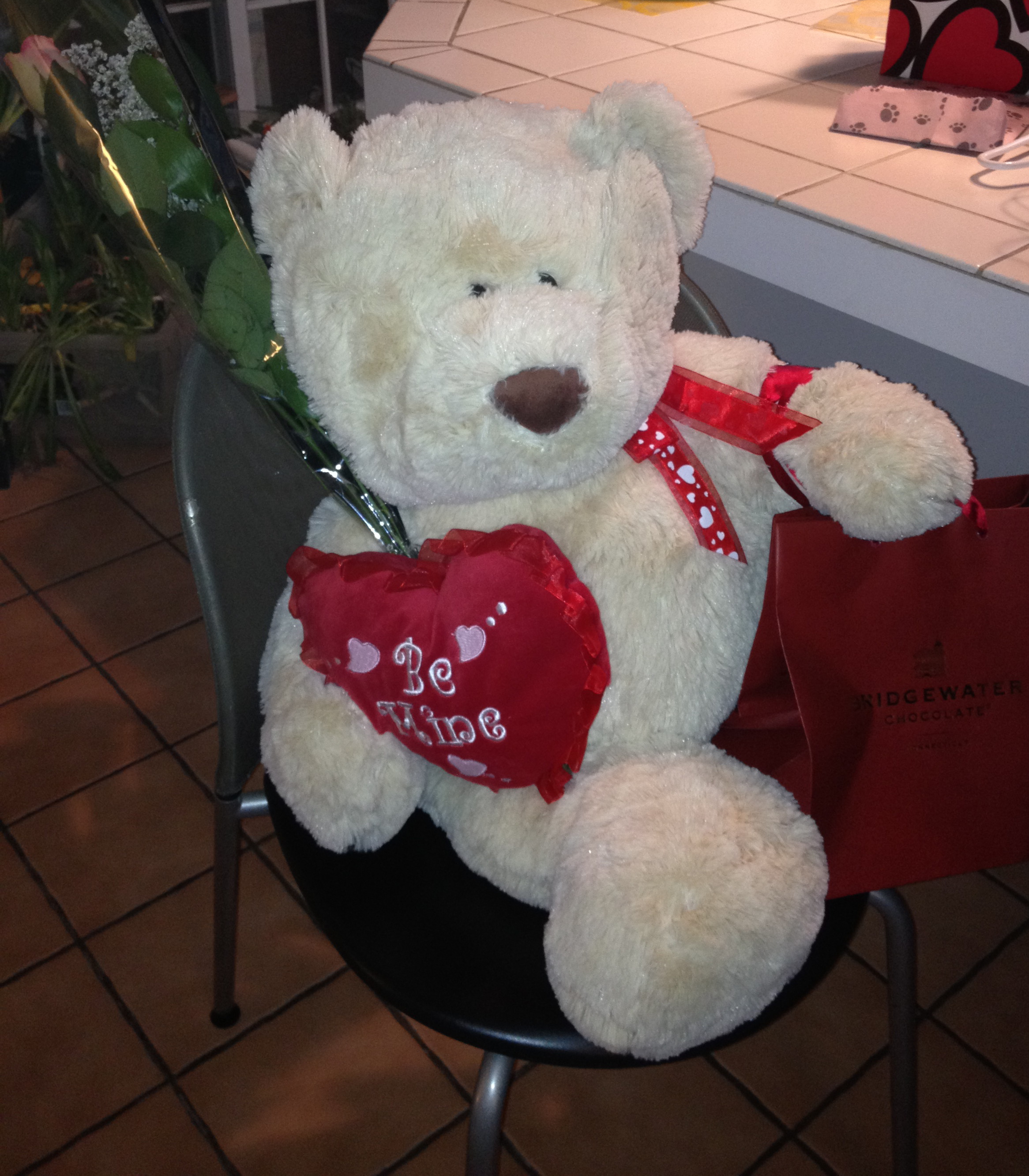 Most married people, particularly men, evidently become totally flummoxed when trying to remember romantic occasions like
their own anniversaries, but somehow my husband and I manage to celebrate not just one such occasion each year, but two –
both our wedding anniversary and the fateful date on which we first met. And we have no trouble remembering the second of
these (as you can see from this festive display, to which I came home last night), because it occurred on a rather unforgettable
day – Valentine’s Day. Most married people, particularly men, evidently become totally flummoxed when trying to remember romantic occasions like
their own anniversaries, but somehow my husband and I manage to celebrate not just one such occasion each year, but two –
both our wedding anniversary and the fateful date on which we first met. And we have no trouble remembering the second of
these (as you can see from this festive display, to which I came home last night), because it occurred on a rather unforgettable
day – Valentine’s Day.
Valentine’s Day of 1982, to be exact. And so I woke up yesterday morning and realized that we had met precisely
30 years ago, when some mutual friends set us up.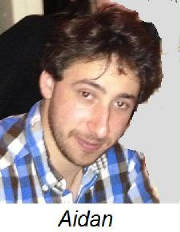
“A
blind date on Valentine's Day?” noted our son Aidan, when I emailed him to point this out. “Now that's a low pressure
date, nice and casual. Your friends were crazy!”
Perhaps. Or were they? Also, if my friends were crazy, what does that make me?
After all, I didn’t just agree to go on a blind date that Valentine’s Day. I went on two of them.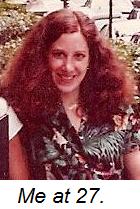
As
I relate in my still-unpublished book – the book that I may self-publish soon -- I was just about to run out when the
phone rang in my apartment in New York City on an icy Sunday afternoon in early February, three weeks after my twenty-seventh
birthday. The caller was my older brother Joel, and, like the blunt, direct fellow that he always had been, he didn’t
bother to chat for even two seconds before getting down to business.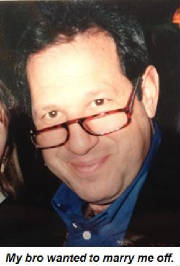
“What are you doing next Sunday?” he asked. “There’s someone I’d like you to marry.”
Such
is the fate of almost any Jewish girl who approaches the overripe age of 30 without having a husband, or at least a viable
prospect for a future fiancé in sight. Remain hanging on the proverbial vine just a little too long and your entire
family throws all sense of subtlety, along with caution, to the wind in the interests of marrying you off.
Mercifully, my one and
only sibling wasn’t proposing that I marry a complete stranger. Of course not. We’d need to get acquainted first.
The young man in question was a political consultant he had just met who had three notable things going for him: Like me,
he was unattached. Like me, he was Jewish. And unlike me, and unlikely as it might be, at the tender age of 28 he was making
in excess of a million dollars a year. Having run a successful senatorial campaign or two, he was deemed a political genius.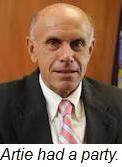
“Hal,”
this prize catch, was an acquaintance of my brother’s closest friend, Artie. Artie was having a thirtieth birthday party
the following week. My brother was calling to invite me to this illustrious event. It presented the ideal opportunity for
the unimaginably eligible Hal and the unacceptably still-single me to meet, and perchance to fall in love.
At this juncture in my life, I was all for love. I
was even all for marriage. I wasn’t necessarily hell-bent on marrying someone who was quite that wealthy and successful.
On the other hand, these were not personal attributes that I would necessarily rule out.
 At the very least, it was nice to have potentially
romantic plans for Valentine’s Day, with which Artie’s thirtieth birthday party would happen to coincide. The
thought of ending up spending this sappy holiday solo always filled me with dread. It invariably left me feeling like everyone
on earth had someone to love and to love them back – everyone, that is, but me. Although I was, in fact, already dating
someone, he had just left for a week’s vacation at a romantic island resort without me. That made me wonder whether
I really had a boyfriend, or would still have a boyfriend, by the following Sunday, anyway. At the very least, it was nice to have potentially
romantic plans for Valentine’s Day, with which Artie’s thirtieth birthday party would happen to coincide. The
thought of ending up spending this sappy holiday solo always filled me with dread. It invariably left me feeling like everyone
on earth had someone to love and to love them back – everyone, that is, but me. Although I was, in fact, already dating
someone, he had just left for a week’s vacation at a romantic island resort without me. That made me wonder whether
I really had a boyfriend, or would still have a boyfriend, by the following Sunday, anyway.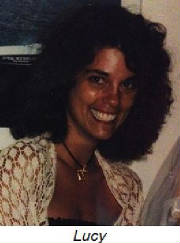
The
next day in the office, Lucy Nathanson, a stunningly pretty production assistant at the magazine at which I worked, also inquired
if I was free the following Sunday. Her new boyfriend Russ, who was a senior editor at Time magazine, had a close
friend from Hartford who was coming to the city for the weekend. Lucy’s boyfriend had requested to be fixed up with
one of her friends.
Now, I already had committed to meeting my brother’s friend’s friend on Sunday. I also already
had been fixed up with enough people in my lifetime to know that most of the men you got fixed up with ended up being in drastic
need of fixing up themselves. But there was another basic thing, or three, that I also had learned about blind dates.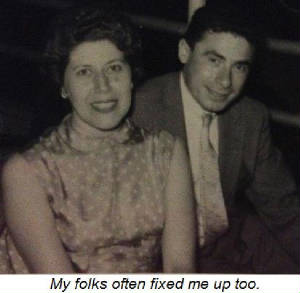
If
you let your mother fix you up, as I regrettably had, you ended up being stuck for the evening with a younger version of your
father. If you let your father fix you up, as I regrettably had, you also ended up being stuck for the evening with a younger
version of your father.
But if you let someone hot like Lucy fix you up, you were likely to end up with someone hot, because hot
guys were the only guys that someone like Lucy would date. No, hot guys were the only guys that someone like Lucy thought
anybody should date.
My only question was why it was worth my while to meet a man who lived in Connecticut. To me, anything outside
of New York City might as well have been in another country. Hartford practically was another country. It was over
two hours away.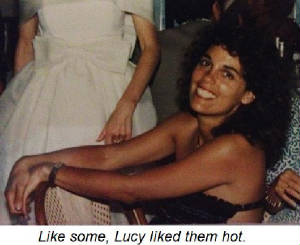
Lucy
shrugged. “Why not just meet him?” she asked. She already had done so herself and could attest to the facts that
he was really cute and he drove a BMW.
I wasn’t really much of a car person, and was even less impressed by status.
I couldn’t have cared less whether he drove a Rolls Royce or a run-down Chevrolet. “Really cute,” however,
was another story. Really cute, by Lucy’s standards, probably was really cute.
Fortunately, it turned out that Lucy wanted me to meet her boyfriend’s friend by coming to her apartment for brunch. Even though Artie’s party was
out on Long wanted me to meet her boyfriend’s friend by coming to her apartment for brunch. Even though Artie’s party was
out on Long Island, it didn’t begin until mid-afternoon. It would be a bit hectic – and perhaps self-indulgent – to
go on two blind dates in one day, not to mention that I already had agreed to see my current boyfriend on Sunday night. But
after five years of living in a three-ring circus like New York, I was used to juggling. There was no reason that I couldn’t
negotiate this trifecta. Island, it didn’t begin until mid-afternoon. It would be a bit hectic – and perhaps self-indulgent – to
go on two blind dates in one day, not to mention that I already had agreed to see my current boyfriend on Sunday night. But
after five years of living in a three-ring circus like New York, I was used to juggling. There was no reason that I couldn’t
negotiate this trifecta.
The day before the party, I went to buy Artie a birthday present. Men, as we all know, are difficult to shop for. I generally try to avoid neckties – no matter how intimately you may know a man, you still may not get his
taste in ties – and go for socks, instead. One size fits almost all, almost all are reasonably affordable, and who among
us, given those mysterious disappearing acts in the clothes dryer, couldn’t use a few more pairs? shop for. I generally try to avoid neckties – no matter how intimately you may know a man, you still may not get his
taste in ties – and go for socks, instead. One size fits almost all, almost all are reasonably affordable, and who among
us, given those mysterious disappearing acts in the clothes dryer, couldn’t use a few more pairs?
So I headed down to one of the city’s most stylish
men’s stores, Paul Stuart, where I painstakingly selected, in keeping with the impending holiday, a pair of bright red
socks, a pair of plain black socks, and a pair of black socks with bright red hearts. (Although Artie was a lawyer, like my
brother, and would later become a judge, back then he seemed to have a bit of a wild side.)
Then,
after wandering around idly for a few blocks, I descended into the subway. Within minutes, a train screeched to a halt and
a pair of doors opened directly in front of me. I stepped aboard, looked straight ahead, and came face to face with Sam.
Sam,
the most perfect man I’d ever met. Sam, the one man I could not forget. Sam, the already married man I’d encountered
at work and been secretly carrying a mammoth torch for, a sizzling flame that just wouldn’t die, for the better part
of a year.
Over that year, I had considered that maybe Sam was not the flawless paragon of virtue I believed him to be; that for
all I knew, he was demanding, distant, or moody. Maybe even mean. I’d tried to convince myself of these terrible things.
But I never had.
I’d
tried to convince myself that someday soon I would meet someone else who was actually available, and that he, too, would be
handsome and brilliant and perceptive and warm and contemplative and unpretentious and literary and talented, and that he
would make me forget about every other man I’d ever met, including even Sam.
But I never had.
I also had remained unwilling to destroy a whole family
with an extramarital affair, the way my own family had been torn apart when I was young. And so I had avoided him and resolved
that I would abandon all hopes that Sam’s marriage might somehow come to an end, setting him miraculously free to be
with me, if he ever became a father.
But he never had.
And there he was, standing before me now. His face lit up instantly to see me. Mine, I could tell, just looked
shocked.
Of all the cars in all the subways in all of New York City, I’d had to walk into his.
Over
the din of the rumbling train, we exchanged all the news that either of us could bear to report, mostly events of a professional
nature. He didn’t mention any changes in his marital status, so I could only assume there were none. But after a short
while, as the train rumbled and groaned its way uptown, I could stand it no longer.
“Damn it, Sam,” I exclaimed, “why
don’t you guys have some kids already?”
Now it was his turn to look shocked. I’d caught him completely off guard.
“I
can’t believe you asked that,” he said. “We just found out. My wife is pregnant. We haven’t told anyone
yet.” They were going to have dinner with her parents that very night and reveal the blessed event.
“Mazel tov!” I said, blurting out the
phrase with which any good Jew greets any good news. “Really, that’s wonderful. You must be so happy.”
“We
are,” he said. Indeed, his eyes shone. But his mouth looked apologetic and a little sad. Seconds later, we thundered
into my station and I heard the doors part behind me.
“Well, see you,” I said as I stepped out, my eyes still magnetically locked
on his. “Take care of yourself. Take care of the baby!”
He
smiled wanly at me. I smiled back. Then the doors closed and he was gone.
I ambled the five blocks back to my building slowly,
my arms wrapped around my midsection. I wasn’t just huddling against the frigid cold. I felt like I’d just been
stabbed.
Throughout
that year, I had continued to go out with plenty of guys, but my heart never had been fully in it. No matter whom I met, my
real feelings had always been kept on reserve. With my hopes now dashed, my soul had been set free. But this freedom felt
less like openness than emptiness. My heart abruptly had been deserted, like a nice, clean house where nobody lived anymore,
or nobody, at least, was home.
How
bizarre it was that I had ended up in that subway car at that exact moment. Or maybe it had been beyond bizarre. It had been
bashert, the Yiddish word for “fate.”
I lived in a studio apartment on the top floor of a brownstone on
West 88th Street. As I forlornly rounded the last of the four flights up, I heard my telephone begin to ring inside. I bounded
down the hallway, then fumbled frantically with the keys, struggling to unlatch the door before the phone would stop. It didn't.
I reached it on the eighth ring.
I
didn’t recognize the caller’s voice. His delivery was deep, with the resonance of a radio announcer’s. He
said that he’d gotten my number from his friend’s girlfriend, Lucy. He needed my address so that he could pick
me up for her brunch the next day.
Oh, of course. Blind date No. 1! His first name was Harlan and his last was Levy, which
he pronounced to rhyme with “heavy.” He said that he was a television news reporter at the NBC affiliate in Hartford.
That helped explain the Ted Baxter voice. I asked if this meant that he stood in front of a news scene each night
reading from a prepared script. It was a snotty, impertinent question, but he didn’t seem to take it that way. He replied
affably that he wrote all of his own material. I had to admit that he sounded nice.
I’m
ashamed to confess that I’d been on enough blind dates in the previous two years to have an entire blind-dating wardrobe.
That is, my mother had persuaded me to meet numerous young men of her own choosing by plying me with new outfits to wear.
I guess she had my number, all right. If I had been one of those poor, out-of-work people you see standing by the highway,
my placard would have read “Will Date for Clothes.”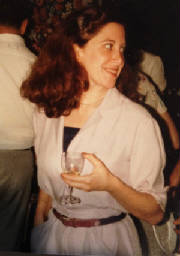
The
outfit I’d chosen to get me through this action-packed day was selected for both comfort and style. A silk jumpsuit,
it was modeled after a garage mechanic’s monkey suit but in a pale lavender shade, worn open to the waist with a violet
camisole underneath. Cinched by a narrow purple belt, it was slinky enough to show that I was then a svelte size
6, but loose enough to leave a great deal to the imagination.
The TV reporter who wrote his own material arrived at around 10,
as promised. With straight dark hair, warm brown eyes and wire-rimmed glasses, he was indeed cute. He looked, in fact, as
people often told him, a little like a Jewish John Lennon.
The promised BMW was nowhere in sight, but that was of little consequence.
Lucy lived only a few blocks away. It was an easy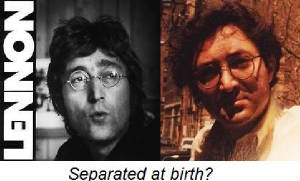 walk. Chatting animatedly as we strolled along, I quickly formed an initial impression that my date was funny and smart,
but one of the most nervous people I’d ever met. He rarely looked me right in the eye. Maybe, I figured, he was shy.
Like me. I never really had been the look-you-right-in-the-eye type, either. walk. Chatting animatedly as we strolled along, I quickly formed an initial impression that my date was funny and smart,
but one of the most nervous people I’d ever met. He rarely looked me right in the eye. Maybe, I figured, he was shy.
Like me. I never really had been the look-you-right-in-the-eye type, either.
As we walked, it crossed my mind that I had neglected
to ask Lucy what to bring. No good Jew visits anyone's house empty-handed. We needed to find a cake, and fast! I’d
often noticed a tiny bakery between my building and hers, but never had been inside. Frankly, I never had dared to go inside.
The place was called The Erotic Baker, and I could only imagine what it sold. Yet our journey to Lucy’s took us through
a totally residential area. All other nearby stores lay further west, and we were already too late to make a detour.
As
we entered the small bakeshop I’d long avoided on West 83rd Street, I was alarmed to find that my fears about what lay
within had been completely founded. The wares inside the glass case were very attractive, but offered little choice. Half
the cakes were shaped like a pair of breasts. The rest were giant phalluses. It somehow seemed even more embarrassing to suggest
that we leave than to choose. I tried hard not to blush as we deliberated, finally settling upon a big chocolate-frosted,
uh… male organ.
“Do you want anything written on it?” the girl behind the counter asked matter-of-factly, as though we
had just purchased a traditional, round buttercream embellished with piped roses.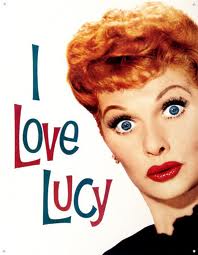
Harlan from Hartford avoided meeting her eye as she looked toward me expectantly.
Suddenly, inspiration overcame mortification.
“How about ‘I love Lucy’?” I asked.
He smiled broadly and nodded. Now I really blushed. I was a nice
Jewish girl. What if my brainstorm for this risqué inscription gave him the wrong idea about me?
Actually, in the interests of keeping him interested,
I could only hope that this bawdy impulse was giving him the wrong idea about me.
When we finally arrived at Lucy’s, our
lusty confection was met with raucous laughter. Reunited with Lucy’s boyfriend, my cute date began to relax. The more
that he relaxed, the cuter he became. When an hour or two had raced by, and it came time for me to bid him goodbye and leave
for Long Island, I began having second thoughts.
“Maybe I’ll call Penn Station to see if there’s a later train,”
I announced.
When it came time to leave for the later train, I decided to take an even later one.
By
the time I had managed to miss three trains, my date must have figured that his prospects were good. When it finally grew
so late that I risked missing Artie's party entirely, he politely offered to accompany me downstairs and put me into
a cab. Then he did something even more polite. He opened the cab door and helped me get inside.
“Let me ask you something,” he said
earnestly, crouching down to my eye level before shutting the door. “If I came back next Saturday, would you go out
with me?”
“Sure,” I said, realizing just as I said it that this meant I would have to break up immediately with
my current boyfriend, with whom I had a standing date for Saturday nights. But did it matter? If I was truly that smitten with
the boyfriend, then why had I accepted two blind dates?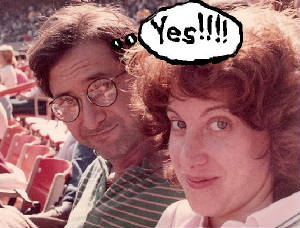
Besides,
there was something awfully refreshing about having a man commit to meeting me a second time while the first meeting was still
underway. During my five years of living in New York, I had discovered that no matter how enthusiastic any guy might
feel about you, he still would continue to come across as totally noncommittal. Even if he liked you when you met, you still
wouldn’t hear from him again for at least a week or two. New York men just made it a strict policy to remain detached.
Meanwhile, I had grown up believing that detachment,
not hate, was the opposite of love. And while I slowly had come to expect it, and then even to accept it, I kept wishing and
expecting that eventually I would meet someone who would take one look at me and say, “Yes!!!”
Now one had. Dare I hope that this miracle might
strike twice in a single day?
By
the time I arrived at Artie’s party, the cake (a normal, rectangular one) had already been served. Artie still looked
thrilled to see me. My brother, however, did not. Where had I been all this time? He’d nearly given up. He indicated
my intended date, who looked none too cheerful himself. A pale, stocky fellow with short-cropped, light brown hair, the esteemed
Hal sat across the room debating politics combatively with several male guests. He looked nice, but a little shlubby,
with wrinkled, ill-fitting clothes. I listened to him briefly from afar, then wandered off to schmooze with my sister-in-law.
When
the festivities broke up, surprisingly early, I figured that my brother’s match-up scheme had been miserably foiled,
until he approached me with my prospective soul mate by his side.
“I’d like you to meet Hal,” he said pointedly.
“He’s driving back to the city and says he wouldn’t mind giving you a lift.”
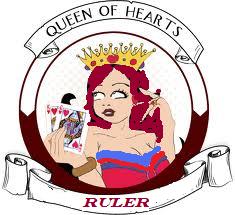 So I got to sit beside the venerable
Hal for more than an hour, trying to make clever small talk. It wasn’t easy. For my brother’s sake, I did my best
to answer all of his queries with personality. It felt more like being interviewed for a position than flirted with, though.
By the time Hal had dropped me at home, I’d gotten the impression that had I been running for office – a romantic
office, I mean, if there were such a thing, like the ruler of his heart – I might have won, but only
by a narrow margin. I also realized that had he been running for the ruler of mine, he would have been the runner-up. By a
mile. So I got to sit beside the venerable
Hal for more than an hour, trying to make clever small talk. It wasn’t easy. For my brother’s sake, I did my best
to answer all of his queries with personality. It felt more like being interviewed for a position than flirted with, though.
By the time Hal had dropped me at home, I’d gotten the impression that had I been running for office – a romantic
office, I mean, if there were such a thing, like the ruler of his heart – I might have won, but only
by a narrow margin. I also realized that had he been running for the ruler of mine, he would have been the runner-up. By a
mile.
So it was probably just as well that I never heard from him again.
I did hear from my man in Hartford, though. He called me every night that week.
I couldn’t tell if he was
going to great pains to plan the perfect date for us for the following weekend or he just wanted to hear my voice.
I also wondered anxiously if he was presumptuous enough to assume that he was going to be spending the night with me on that
return trip. So it was a great relief when he mentioned that he’d be rooming with Lucy’s boyfriend, Russ.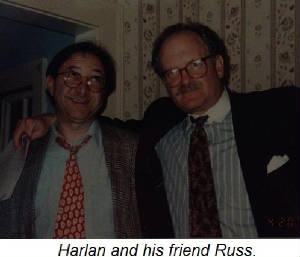
Actually, to be more precise, he’d be rooming with Lucy’s ex-boyfriend, Russ. Just as I had
been going on blind dates behind my boyfriend’s back, Russ had gone on one of his own behind Lucy’s. His date
actually had been set up by his mother, but against all odds he had liked the woman immensely and planned to see her again.
He’d admitted this to Lucy on Sunday afternoon, sometime after I’d left.
It wasn’t the sort of
confession anyone wants to hear from her boyfriend, especially on Valentine’s Day. And so I’m convinced that had
I not gone to meet Lucy’s boyfriend’s friend from Hartford that Sunday morning, I never would have met him at
all. For by Monday morning, Lucy and her boyfriend Russ had irrevocably broken up (and in the not too distant future, he would
be engaged to his own blind date, his mother’s choice, Ellen).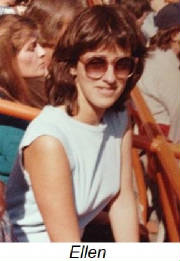
Just as I had anticipated, I similarly had parted ways with my current boyfriend, Neil, a nice, Jewish, but non-demonstrative
Daily News reporter. In fact, it turned out that we had grown so disenchanted with each other that it was as if our
eagerness to break up was a breaking story, and we were competing to see which one of us could report it to the other first.
This not only relieved any lingering guilt I felt about that weekend’s clandestine dates, but also cleared the deck
for the coming weekend, plans for which were forging ahead.
The political consultant’s career and fortunes
would continue to flourish, but he would not get married himself for nearly 20 more years. He also would end up being charged
in 2009 with a 123-count indictment for scheming to defraud the New York State pension fund and be sentenced to several years
in prison. That's where he is now.
My man in Hartford, though, continued to call. And visit. I saw him every
single weekend. Then I married him when we finally found two jobs in the same city, in 1984.
And 30 years, two
houses, and two nice Jewish kids later, we are still together. Cause to celebrate, wouldn’t you say? Now how could you
forget something like that?
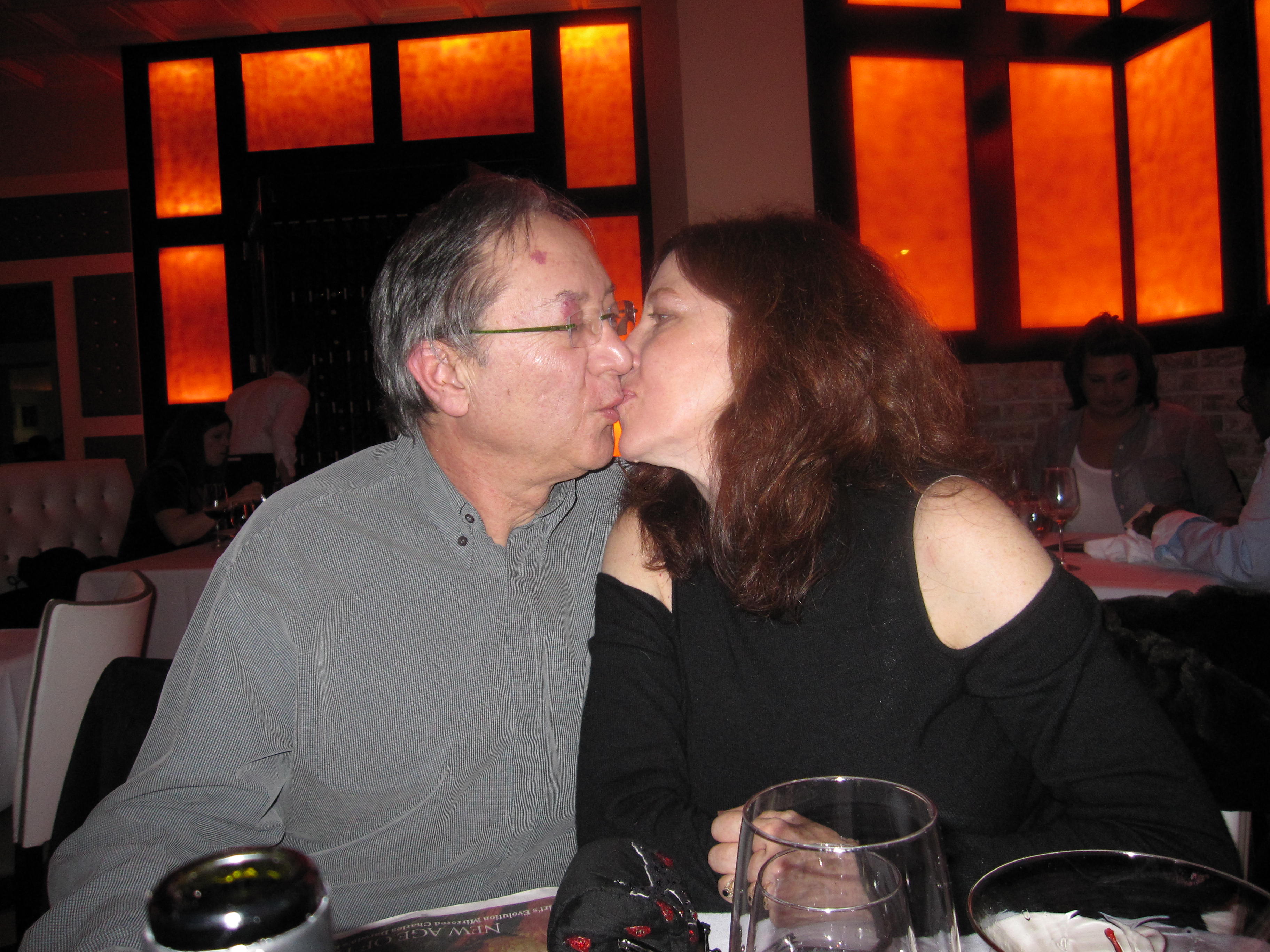
Wednesday, February 8, 2012
A Word From the Weiss
There was a lot of drama in my life last week. An awful lot. And
I do mean drama.
In fact, as I write these words, I have no idea how this tale I have to tell will end. All I can tell you is that most of
the drama involved one or both of my kids.
Face it, there’s no one like your own children when it comes to knowing precisely how to push your
buttons, is there? Of course, that can work both ways. I don’t just mean that we can push their buttons right back (just
like our own mothers once pushed ours). I mean that sometimes they actually manage to push our buttons in a good way.
Just when we’re feeling miserable, or unappreciated, or otherwise distraught, they suddenly do or say some little
or unexpected thing that snaps us right out of a foul mood (something which befalls even the best of us, as well as all the
rest of us).
And I must say I needed a lift. Even with one of the mildest and least menacing winters in memory, this isn’t
exactly the cheeriest time of year. But when I was feeling glum last weekend, my son came out with one of the nicest
things he’s ever said to me.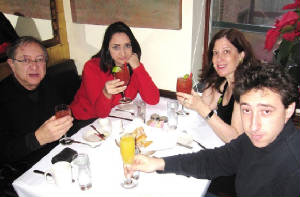
We were sitting at brunch on Sunday morning. Although Nice Jewish Dad and I had ventured into NYC overnight
to visit our kids yet again, nearly everything had gone slightly awry from the start. We’d arrived to find our
hotel chaotic and under construction, with garbage bags piled up in front and the lobby overflowing with chattering guests
and checked baggage. And the play we’d gone to see in previews had been just so-so. So all four members of my family
seemed to be feeling dispirited and crabby.
Searching for some safe subject to broach, I asked my son what he was serving at his Super Bowl party on
Sunday night. Although he’s constitutionally the opposite of a party animal – he doesn’t even enjoy celebrating
his own birthday – this is the one annual event Aidan has been throwing since he was 11 or 12. I assumed he would be
ordering pizzas for his friends, and perhaps that was the plan. But that’s not what he said.
He turned to me and said, “You
know what I want to serve? I wish you could come to my party and make burgers for all of my friends, the way you did all those years when I was growing up. There’s really nothing better than that. I’d
almost pay you to do it.” friends, the way you did all those years when I was growing up. There’s really nothing better than that. I’d
almost pay you to do it.”
And if you don’t understand how much that warmed my heart,
then let me tell you about that very first Super Bowl party he threw back in 1997 or 1998. Aidan was in middle school and
said that he was afraid to invite his friends over for the Super Bowl because I would embarrass him by serving his chums all
sorts of fancy hors d’oeuvres.
 “Honey,” I assured
him, “I wasn’t born yesterday. I know what Super Bowl food is.” Then I prepared guacamole, nachos, salsa
and chips, and stacks of juicy burgers with a plentiful variety of toppings, including sautéed onions and mushrooms
and assorted cheese (no, the last may not be kosher, but it’s de rigueur when it comes to fan fare). Not to mention
brownies and chocolate chip cookies fresh from the oven for dessert. That may not sound like anything unusual. The unusual
part was that I actually got something right for once – so right that he’s still throwing that event more than
a decade later, and wishing that he could come close to approximating the memorable original. “Honey,” I assured
him, “I wasn’t born yesterday. I know what Super Bowl food is.” Then I prepared guacamole, nachos, salsa
and chips, and stacks of juicy burgers with a plentiful variety of toppings, including sautéed onions and mushrooms
and assorted cheese (no, the last may not be kosher, but it’s de rigueur when it comes to fan fare). Not to mention
brownies and chocolate chip cookies fresh from the oven for dessert. That may not sound like anything unusual. The unusual
part was that I actually got something right for once – so right that he’s still throwing that event more than
a decade later, and wishing that he could come close to approximating the memorable original.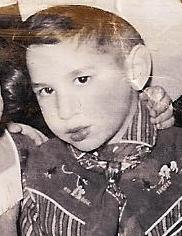
Also, if you don’t understand why that was music to my motherly ears, then let me tell you about the
time that my brother told our mom that my aunt made better peanut butter and jelly sandwiches than she did and she cried for
hours, even though he was only 7 at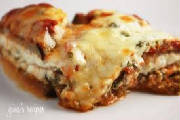 the time. Or how my friend Pat still brings up weekly how one of her sons told her that his mother-in-law’s eggplant
parmesan is “a million times” better than hers. Ouch. the time. Or how my friend Pat still brings up weekly how one of her sons told her that his mother-in-law’s eggplant
parmesan is “a million times” better than hers. Ouch.
My point is that they don’t say most of
these things because they mean them. Nor do they say them because they’re necessarily true. They say them only to hurt
us. Or to warm our hearts. And last weekend, for some reason, my son wanted to warm mine.
One reason, I suspect, was that
he had already managed to devastate me just a few days before. Although I’ll be the first to admit that maybe
I kind of had it coming.
His sister had called me that morning, and even without her announcing it outright,
I could tell that there was a problem just by the unmistakable note of stress in her voice.
“What’s wrong?”
I asked.
“I have a problem,” she said.
I braced myself for some terrible news. Sometimes when Allegra says
this, the news actually is terrible. Other times, she proceeds to tell me about some minor mishap that has befallen someone
I’ve never even met. In this case, the issue was about her. But it wasn’t, in my estimation, all that terrible.
She’d learned that her hours were going to be cut this month for the baby-sitting job she’s taken while doing
an internship at an after-school program in Harlem and pursuing her career as a jazz singer in New York.
“That’s
it?” I asked.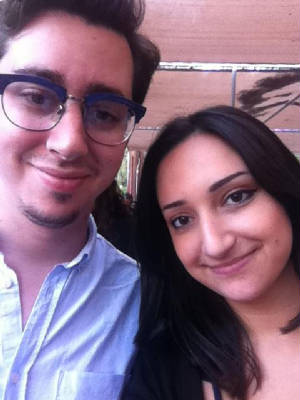
Annoyed, she explained to me that she was trying to establish some degree of financial independence and had
been hoping to start paying her own rent. She also had been counting on having some extra spending money when she makes an
extended Valentine’s Day weekend visit to her longtime, now long-distance, boyfriend Stevo in L.A.
As relieved as I was that her problem
was not all that pressing, I could appreciate her distress. So after hanging up, I decided to take a gander at Craigslist.
No, she hadn’t requested my help. At 22, she wants to be independent. Yet I’d found her current internship
on Craigslist, just as I'd found my son’s first film job online. Worth a try, I figured. But now the pickings
were slim, to say the least.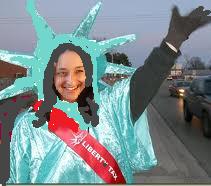
Bypassing the countless postings for egg donors – young, Jewish women seem to be in endless demand
to serve as surrogate nice Jewish moms – I briefly considered an ad for something called “Liberty wavers,”
seeking “outgoing, energetic people to be our costumed characters.” But this only made me imagine Allegra dressed
up as the Statue of Liberty. She’s far too outgoing and energetic to be convincing as a statue of any kind.
I forwarded an ad for part-time
dog walkers. Then a novel ad that in some ways had her name all over it caught my eye. “BEAUTIFUL, FRIENDLY GIRLS,”
it began.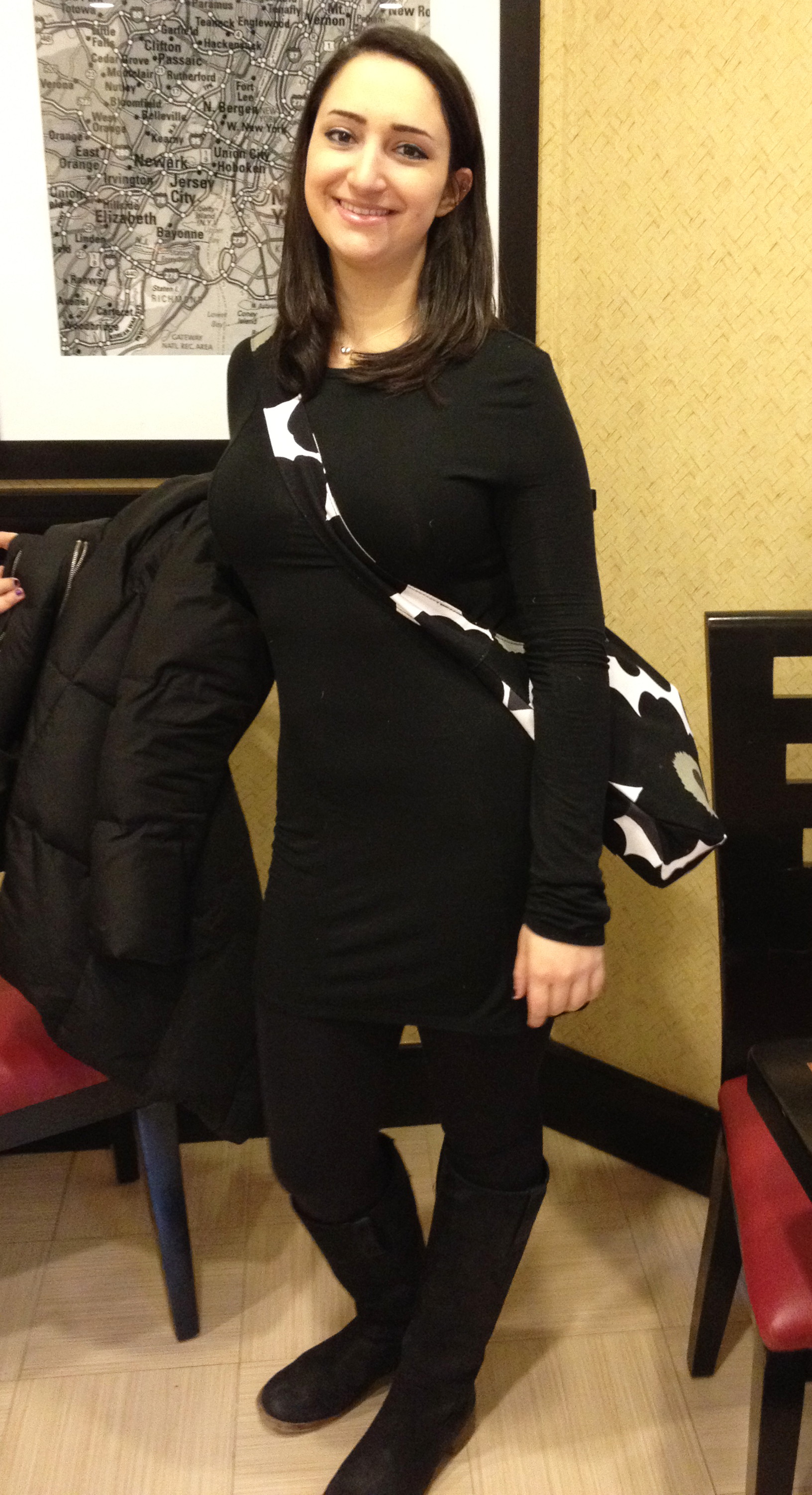
“Are
you a beautiful, friendly, cool girl trying to make ends meet in this expensive city?” it asked. Indeed she was. “Do
you want to live the good life...travel, eat at fine restaurants and shop at Bendel, Bergdorf and Bloomingdale's?”
Indeed she did.
“If you're ready to make a change, we are looking for a few
exceptional girls to work with us…” Where? Oh. Oops. “…in our upscale private Roleplay and fetish
studio.”
OK, many mothers, nice, Jewish or otherwise, might hesitate to send their daughters an ad soliciting them for such lurid
services. Those mothers would not be me.
Sorry, maybe not everyone out there shares my rather perverse sense of humor. But I’ve
always believed that my daughter does. And obviously I was sending her this ad in jest. To me, it was so over-the-top outrageous that
it was too good to make up.
“Let me clarify that ‘Fantasy Roleplay’ is not S&M,” the ad continued. “We
are not a commercial Dungeon.” And although some of their “esoteric” fantasy sessions included “foot
worship, secretary fantasies, tickling and trampling,” many clients were nice guys who “just want to hang out
and talk!”
Evidently, I was wrong about that shared sense of humor. Or maybe she just saw nothing funny about being
under-employed. Because within minutes I got a succinct, rather snippy email back from Allegra in response. “Mom,”
it read, “I'm just going to try to get more gigs for the month of February. I don't want to do porn. Thanks, though.”
But that was nothing compared to the way her brother reacted. You see, I also found a pair of listings so perfect for
Aidan that I couldn’t resist passing them on as well.
One ad actually seemed to be genuinely promising. A new Web site
needed writers to contribute short features about things to do or see in NYC. Aidan already worked as a free-lance writer,
and he could easily outdo the lame writing sample that they'd supplied.
The one that I really couldn’t resist sending, though, was an open call for actors to participate in
a new reality TV show. It didn’t involve any pornography (I assumed). It had nothing to do with fetishes or being a
“commercial Dungeon.” Nonetheless, it was sure to get his goat.
Only the day before, I’d
gotten a call from Aidan with that “I’ve got a problem” tone. As with his sister, I’d braced myself
for an outpouring of gripes, only to hear that, once again… well, you know… everyone should be so lucky as to
have such problems.
“You wouldn’t believe what Kris just said to me,” he began with a world-weary sigh.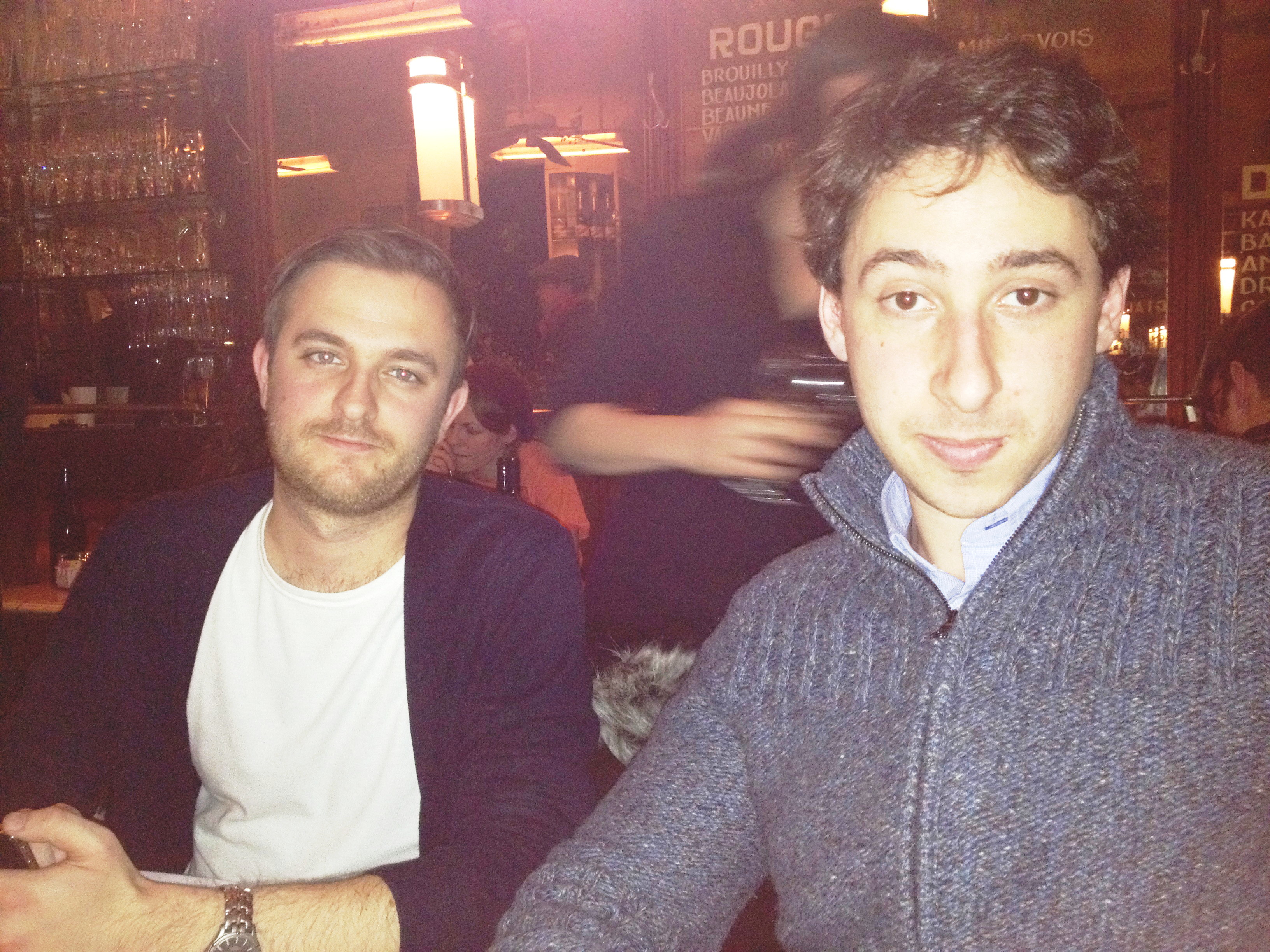
Aidan and his friend Kris met the summer before Aidan graduated college, when both were working as interns
on Taking Chance, an HBO movie starring Kevin Bacon. Since then, Aidan, an aspiring screenwriter, and Kris, who hopes
to direct, had become close friends and collaborators on various short film projects.
Meanwhile, both had held an assortment
of mostly entry-level jobs in film and TV. Aidan is now between jobs while attending graduate school. But Kris is working
as a production assistant on a new HBO series based on a novel called The Corrections.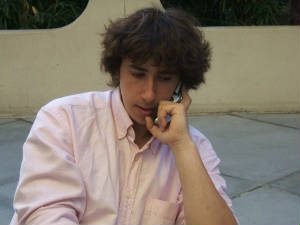
That afternoon, Kris had been asked at work if he had any friends who might play a small role in the series.
They needed a young man to portray an intern working for a movie producer. Kris had instantly volunteered Aidan, noting that
he had, in fact, worked as an intern in the movie industry on more than one occasion. Then, at their request, he immediately
had submitted assorted headshots of Aidan, including this one of him working as a young intern at Paramount Pictures
in L.A.
This time, I couldn’t even begin to feign sympathy. I couldn’t contain my delight.
“You’re going to be
on a TV show?” I squealed. “A show on HBO?”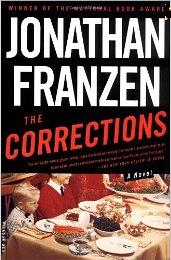
Heightening my exhilaration was the fact that I’d read the book on which the show was based. The
Corrections was a really big book when it came out in 2001, and not only because it weighed in at a hefty 568 pages.
It won the National Book Award for fiction, received the unequivocable boost of being chosen as an Oprah’s Book
Club selection, and was later proclaimed by a Web site called The Millions to be the best book of the decade “by a mile.”
All this helped make its author, Jonathan Franzen, a household name.
Well, at least he was a household name in my
house. Aidan had complained to me that Kris hadn’t read the book and kept referring to the author as Jonathan “Frazen.”
The dubious honor Kris had procured for him did little to make up for this literary gaffe.
“I’m not interested
in being an extra,” Aidan grumbled. Having worked on many shows, he knew the extent to which these nameless underlings
were held in the lowest regard.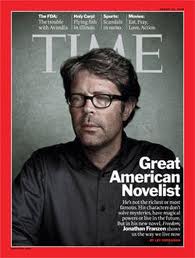
“This isn’t to be an extra,” I argued. “You’d have an actual part. A named
role!”
“Named role?” he echoed derisively. “How many exclamation points are you putting after
that?”
He wasn’t as easily impressed. For some reason, this role needed to be cast immediately, and the producers
didn’t want to go through the usual channels or pay the customary rates. Aidan had heard that the compensation was a
mere $85 a day.
“That’s $85 more than I’m making,” I noted brightly. “And 85 more than you’re
making now.” Besides, I added, maybe Aidan would get to meet the author himself . Was he ever on the set?
“Yes, he was there today,”
Aidan replied. “Kris went up to him and said, ‘Mr. Frazen, I have your book -- The Collections -- but
I haven’t read it yet. I just can’t get through the first chapter.’ ”
Aidan also has a twisted sense of humor, you see, and this was just a prime example, I presumed. The main character in the
book, which is about a dysfunctional Midwestern couple and their three adult children, is a writer who has written a book,
the first chapter of which is so ponderous as to be almost impenetrable. The first chapter of The Corrections is,
well, challenging as well. It’s kind of an inside joke.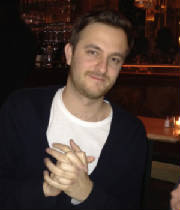
“Oh, c’mon, he didn’t really say 'The Collections,' ” I replied, laughing despite myself.
He finally admitted that he was indeed joking about this entire encounter. By the same token, he wondered if Kris might
be putting him on too, and the TV role wasn’t real. Either way, he wasn't pleased in the slightest, and was even less
amused when I sent him that reality TV want ad the next day.
“Stop sending me job listings!”
he ordered flatly. “I don’t need you to help find me a job.” I told him that I’d only been kidding,
but he failed to see any humor in it. In fact, he sounded so irate that I started off the conversation laughing so hard that
I was crying, but when I realized how deeply I’d offended him, I ended it by crying real tears.
He felt guilty when he realized
that he’d gone a little overboard in chastising me. Of course, I got over it after a short while – I always do
-- but that comment on Sunday about my Super Bowl burgers more than made up for any lingering vestige of hurt.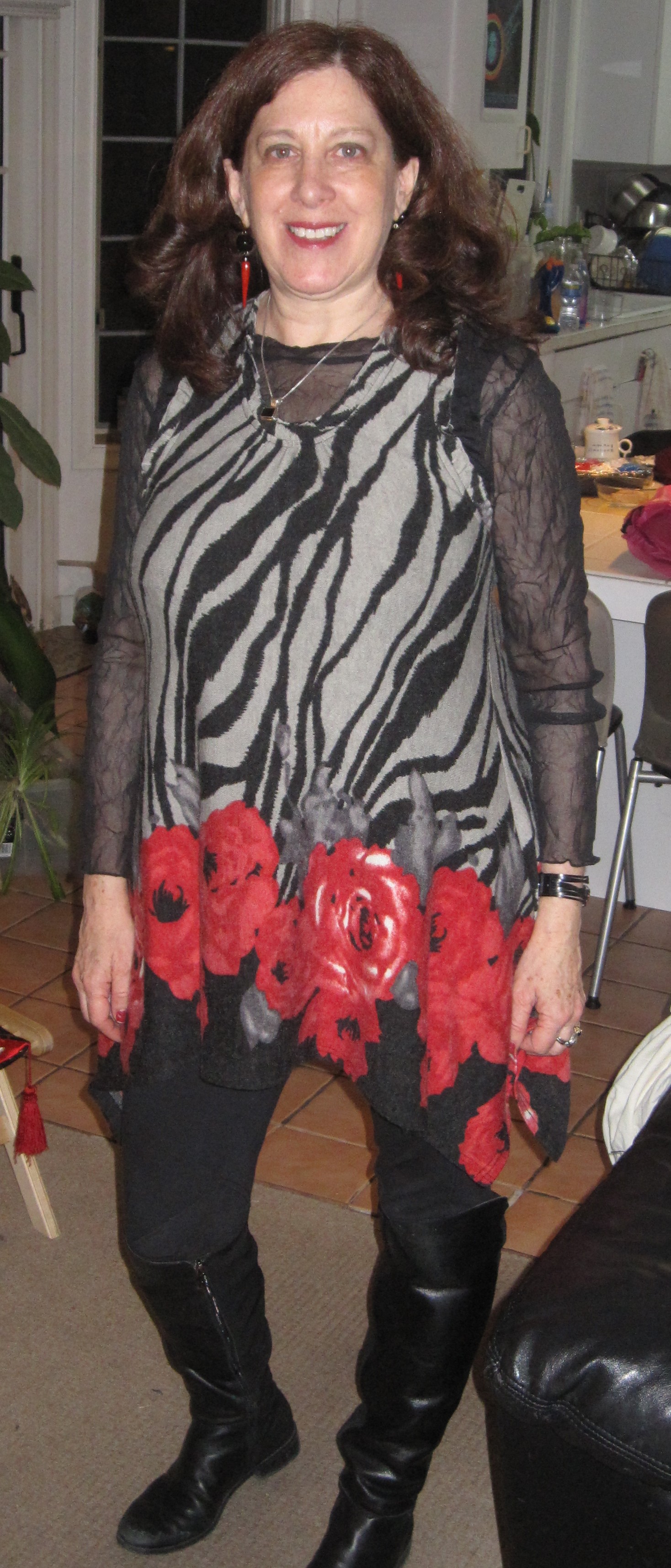
And I must admit that hurt was the last thing I felt when he phoned me on Monday at noon and uttered the
four words that every parent of grown children longs to hear.
“I need your advice,”
he said.
He’d just gotten an email from HBO. Evidently, this TV show thing was no joke. They wanted him to come
in at 2 and audition for a “featured role” on The Corrections.
“A featured role!!!”
he repeated. (OK, those three exclamation points were mine.) “What am I supposed to do?” he asked.
Once again, I was unable to contain
my elation, although he clearly shared no trace of it himself.
“It isn’t fair,” he maintained.
“I’m not an actor. I don’t want to be an actor. I haven’t taken an acting class in at least 10 years.”
Why was he getting an opportunity like this? “I want to be a writer!” he said, seething with genuine frustration.
“You can’t always get what you want,” I said, cheesily quoting The Rolling Stones. “But sometimes
you get what you need.” Why would he possibly need a TV acting job? Maybe what he needed was to work his way into screenwriting
through some sort of back door.
OK, I’m not going to dare make any comparisons to Woody Allen, who writes, directs, and until recent
years starred in most of his own films. But how about Zach Braff, a young actor whom Aidan closely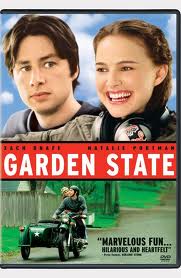 resembles, or so it’s been pointed out to me more than once? Although he made a name for himself starring for years
in that inane TV doctor show Scrubs, he also wrote, directed and starred in a touching and memorable movie in 2004
called Garden State, which also starred Natalie Portman. resembles, or so it’s been pointed out to me more than once? Although he made a name for himself starring for years
in that inane TV doctor show Scrubs, he also wrote, directed and starred in a touching and memorable movie in 2004
called Garden State, which also starred Natalie Portman.
As for fairness, I couldn’t believe that
he was complaining. If he didn’t think his getting this opportunity was fair, then how did he think people who actually
want to act would feel? Our good friends Sally and Dial have a son his age named Sam who is trying to make it as an actor
in New York. How was I ever going to call them and say that Aidan, who had no acting history or aspirations, was appearing
on a show on HBO?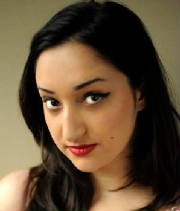
About this, he agreed wholeheartedly. After all, his sister went to music school and has been earnestly honing
her craft for years. It exasperates us all to see untrained singers on shows like American Idol achieve quick
success without undergoing any formal training.
But fairness wasn’t the main thing on Aidan’s mind.
“Do you know what stresses me out the most in life?” he asked. “Do you? It’s having things come out
of nowhere.”
And that’s when the motherly advice that he really needed suddenly kicked in. “Honey, that’s
what life is about,” I said. “It’s things coming out of nowhere. That’s life.”
Sometimes those things are calamities, like an unforeseen illness or accident. Having to appear on a TV show? That,
to my mind, fell under the heading of serendipity. Not disaster.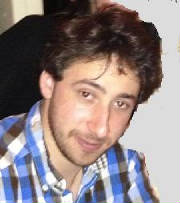
It also irked him no end that all of this was happening so abruptly. With less than two hours’ notice
before the audition began, he barely had time to prepare in any way.
But being a natural worrier myself, I thought
this was a good thing. “Say that they’d asked you to come in on Thursday. By then you would’ve worked yourself
into a frenzy.” It was better to get it over with, I said. Like pulling off a Band-Aid. Or getting surgery.
Of course, he hadn’t actually
landed the role yet. So we soon turned our attention to the more concrete kinds of advice he needed. What should he wear?
What about his hair? And what about the unshaven, scruffy look he’d been exhibiting over the weekend?
To shave or not to shave?
I thought of all the grizzled actors gracing TV these days. Hugh Laurie on House. Singer Adam Levine
on The Voice. Patrick Dempsey on Grey’s Anatomy. Why, thanks to heartthrobs like George Clooney
and Brad Pitt, hobo stubble has become a Hollywood staple.
“Whatever you do, please don’t shave!” I pleaded.
At the same time, I nixed his plan to wear the vibrant shirt with bold blue and black checks he’d sported
at dinner on Saturday night. It was too busy and distracting, I said. “Besides, I don’t think an intern would
wear a shirt like that.”
“You’re wrong,” he countered. “I’ve actually worn that
shirt as an intern.”
 Fortunately, his ultra-stylish
and only female roommate happened to be home. Dara, the daughter of some neighbors of ours in Connecticut, is a senior at
the Fashion Institute of Technology. She also has worked at a tony Ralph Lauren boutique out in the Hamptons. She was happy
to come to the rescue and help dress him to look the part. (It's one thing to be an actual intern, and another entirely to
play one on TV.) She opted for a more sedate, dark purple striped shirt that I’d given him for Chanukah. Fortunately, his ultra-stylish
and only female roommate happened to be home. Dara, the daughter of some neighbors of ours in Connecticut, is a senior at
the Fashion Institute of Technology. She also has worked at a tony Ralph Lauren boutique out in the Hamptons. She was happy
to come to the rescue and help dress him to look the part. (It's one thing to be an actual intern, and another entirely to
play one on TV.) She opted for a more sedate, dark purple striped shirt that I’d given him for Chanukah.
She also sided with me regarding
the stubble. He had little time to shave, anyway.
I could hardly concentrate over the next few hours. You would have
thought I was the one trying out myself. He called back a little after 3. “So, I had the audition,” he said.
 He’d arrived at the offices
of HBO and promptly been given his “sides” to read. (Since my good friend Pat is an experienced actress, I was
familiar with this term, which refers to the piece of paper containing lines from a script you are given at an audition.)
Aidan had only two sentences to say, so he managed to memorize them while waiting. Then he was promptly called to do his thing.
No one else was there to compete for the part. He’d arrived at the offices
of HBO and promptly been given his “sides” to read. (Since my good friend Pat is an experienced actress, I was
familiar with this term, which refers to the piece of paper containing lines from a script you are given at an audition.)
Aidan had only two sentences to say, so he managed to memorize them while waiting. Then he was promptly called to do his thing.
No one else was there to compete for the part.
His scene evidently involved the main character, Chip, a Marxist academic who’s been fired for having
an affair with a student and now helps a Lithuanian crime boss defraud American investors. He’ll be played by actor
Ewan McGregor, who has starred in over 50 films, including 2001’s Moulin Rouge, 2011’s Beginners
with Christopher Plummer, and Star Wars, Episodes I, II, and III, in which he played Obi-Wan Kenobi.
But for the audition, the lines opposite Aidan’s were read by a young woman. “Is there anything
you’ve ever been ashamed of?” she asked.
Then Aidan declaimed those two lines he had committed to memory.
“I once had a haircut I was ashamed of,” he said. “I practically had to shave my head to get rid of it.”
Another woman captured this on an iPhone, Aidan said, rather than using a normal camera, because the footage
needed to be sent instantly to the director for his approval. That director was Noah Baumbach, who has written and directed
such hit films as The Squid and the Whale (nominated for best screenplay in 2005), 2007’s Margot at the
Wedding, starring Nicole Kidman and Baumbach’s now-estranged wife Jennifer Jason Leigh, and Greenberg,
a 2010 ultra-dark comedy starring Ben Stiller.
Afterwards, the woman who had shot the scene grilled him about his particulars, including whether he was
a member of Actor’s Equity or SAG (the Screen Actors Guild). Aidan allowed that he was unaffiliated with these and all
other organizations of their ilk.
“I’m super non-SAG,” he explained, in the interests of full disclosure.
It didn’t matter, she said. And perhaps it didn’t. As Aidan noted to me, some directors prefer using real people
for certain roles rather than actors, so it doesn’t appear fake. Maybe Baumbach was one of them.
I must admit that I continued
plying him for further details, like how he thought he had done, when shooting was scheduled to commence and when he might
hear back. All of this only irritated him. He insisted that he’d already told me absolutely everything -- twice -- and
promptly hung up.
But then he phoned an hour later to let off some of the steam that had continued to build after the fact.
Although the audition was already over, his anxiety about it was not. Why had he submitted to this ordeal?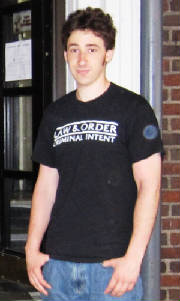
It was another one of those situations in which you worry that you’re
going to fail, but also worry that you may actually succeed. He was already distressed that all of the free-lance TV and film
crew work he’d landed all summer and fall had dried up suddenly when shooting wound down in New York for the winter.
What if he landed this role, then years went by and he wasn’t ever offered another?
“So this could be yet another
field in which you’re not getting work?” I queried.
“Finally! Now you understand!” he
exclaimed. "That’s exactly what I’m worried about.” He was already faltering on enough fronts in his
life, he felt. “If I have to add ‘actor’ to my skill set and repertoire, then eventually I’ll have
to admit to people that I haven’t done it in awhile.”
I don’t know if we Jews have the market
cornered on being neurotic. But somehow, that Woody Allen analogy I’d dismissed was beginning to sound more apt by the
minute.
As the evening wore on, I tried not to get my hopes up too much or to let my sense of nervous anticipation
run wild. After all, I’ve never been accused of being the optimist in the family. That would be my daughter. And in
her typical fashion, Allegra was playing it to the hilt. “I just think that when you get an opportunity that comes
out of nowhere and makes no sense,” she observed, “...well, those are the things that generally work out.”
Finding life to be mostly unpredictable and improbable, I couldn’t exactly disagree.
And when I met my actress friend
Pat for dinner that night, she echoed my sentiments and then some. “You only get opportunities when you get them,”
she said. “You don’t get them when you want them.” Nor do you always get the ones you want.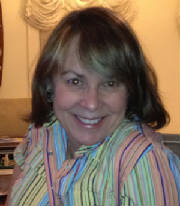
Then again, with some luck, you get the ones you deserve. And although she was an accomplished veteran actress,
she didn’t resent Aidan for having this opportunity, which she felt in his own way he had earned. Being offered
a TV role wasn’t just a fluke, she insisted. After all, he’d worked as a production assistant on Law &
Order: Criminal Intent for three years, getting up at 5 a.m. daily so that he could get to work before 6.
“He’s paid his dues,”
she declared. “What does he want to do – pay more dues? Does he want to wake up at 3 a.m.?”
Besides, rather than begrudging him this windfall, she preferred to consider the ways in which his good fortune
might rub off on her. And she could easily imagine how this might happen. Wasn’t it highly plausible that the intern
Aidan would portray had a nice Jewish mother? And that they would need an actress to play that mother, who might end up becoming
romantically involved with… drum roll, please… Jonathan “Frazen”?
She was kidding, of course. (She's
happily married... to a doctor!) Then again, what would it take for Aidan to perhaps get her a reading, too?
Maybe Aidan was right, after all.
Why is it that good luck often comes back to bite you in the tush, or that when you find buried treasure, it often opens up
a can of worms?
So maybe it wasn’t such a bad thing when Aidan finally called again the next night. I’d jumped
every time the phone had rung all day, hoping to hear his voice. Now that I did, I could tell that the news wasn’t something
about which I should alert the media, although he didn't quite have that "I have a problem" tone.
“It looks like it’s
not going to happen after all,” he said. It wasn’t that he hadn’t done well at the reading, Kris had told
him, or that they’d chosen someone else. They were probably just cutting the scene altogether.
“After all that?” I
asked, incensed that they had put him through so much mishegas.
“After all what?” he
replied. The audition had only taken a couple of hours out of his life, hours when he wouldn’t have been doing anything
especially important anyway. His only concern was about letting me down because I had clearly been so excited.
In fact, he admitted, he had briefly
considered lying to me and pretending to have gone to shoot the scene and to have met Ewan McGregor. (He wouldn’t have
dared lie about meeting Jonathan Franzen. I never would’ve gotten my fill of details about that.)
But then he realized that he would
eventually have to tell the truth when the show aired, or to compound the lie by claiming that his footage had ended up on
the cutting room floor. And still he worried about the potential embarrassment I’d feel when I’d told all my friends
about it, and anyone else who’d listen, then he didn’t appear on the show.
 Other than that, he truly didn’t
care in the slightest about the rejection, he insisted. “I’m not even a little disappointed,” he declared.
“Because I still don’t want to be an actor.” Other than that, he truly didn’t
care in the slightest about the rejection, he insisted. “I’m not even a little disappointed,” he declared.
“Because I still don’t want to be an actor.”
As for me, I did feel terrible, in a way. I
didn’t care that much that he had lost the opportunity. Although it was a chance to bask in a sliver of limelight –
a chance that was pretty cool, you must admit, maybe even glamorous -- it wasn’t something that he had sought out himself
or genuinely wanted. I only felt terrible that he sensed he had disappointed me.
OK, to be totally honest, I was
a little sad that it didn't work out. But I was definitely not disappointed in my son.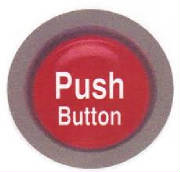
I’m proud of him for trying.
I’m proud of him for having the perspective not to care.
But most of all, I’m proud of who and
what he is. I’m also very touched.
Whichever buttons of mine he may be pushing, he’s still pushing
the buttons on the phone to call home. He cares about my feelings. Why, he cares enough to consider telling a ridiculous lie,
strictly in order to not let me down.
But bottom line? He cares! And that’s what counts.
Thursday, February 2, 2012
A Word From the Weiss
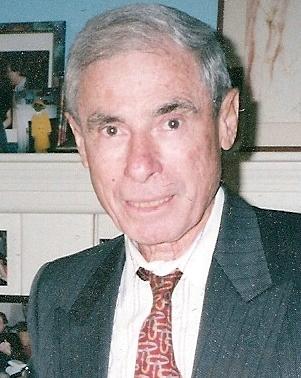 Shortly before my father died, in 1998, I tape-recorded a final interview with him. That may sound a little maudlin, but it
was painfully clear that the end was imminent, and I realized that we’d had many deep conversations over my lifetime,
particularly during his year-long terminal illness, but I had no tangible way to remember any of them. Besides, he was a keenly
savvy man, in many ways, and even after all of those chats, there were things I still wanted to ask him. Shortly before my father died, in 1998, I tape-recorded a final interview with him. That may sound a little maudlin, but it
was painfully clear that the end was imminent, and I realized that we’d had many deep conversations over my lifetime,
particularly during his year-long terminal illness, but I had no tangible way to remember any of them. Besides, he was a keenly
savvy man, in many ways, and even after all of those chats, there were things I still wanted to ask him.
I wanted to know if he had any
final insights to impart. I wanted to have a lasting record of the oh-so-familiar and sonorous voice I soon would never hear
again. But mostly, I wanted to ask if he had any unresolved regrets. To be frank, he’d been flagrantly unfaithful to
my mother during their 27-year marriage, carrying on an affair for 15 years with a woman he would eventually marry, which
left me feeling like someone had put my childhood into a Cuisinart and pressed the button for "shred." I guess I
wanted to give him one last chance to apologize, or at least express some remorse.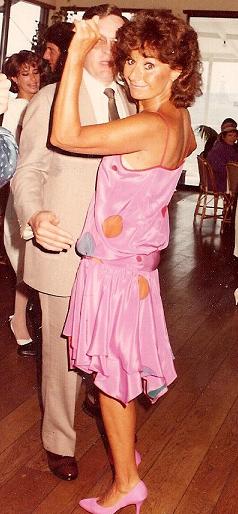
To my surprise, he took on this last thorny issue without hesitation, but not in any way resembling my hopes
or expectations. Despite his having been a rabid workaholic almost to the death, there wasn’t even a passing thought
given to that kernel of wisdom so common as to be little more than a Hallmark-card-worthy cliché: “If only I’d
spent less time at the office and more of it with my family or enjoying life."
No, his big revelation was something
that never would have crossed my mind.
Despite the conflicts that ultimately
torpedoed their turbulent marriage, my Brooklyn-born parents had held a great deal in common, including a lifelong desire
to assimilate. They eschewed their Orthodox roots and joined a Reform temple. They abandoned their kosher upbringing and delightedly
indulged in bacon and shrimp. And when I was 8, they decided to move our family from a predominantly Jewish Long Island suburb
to Armonk, NY, a small, rather snooty town in Westchester where only about 15 percent of the residents were Jews and there
still remained some "restricted" clubs that wouldn't have us as members... or even as guests. This, in retrospect,
had been so misguided as to remain his greatest regret.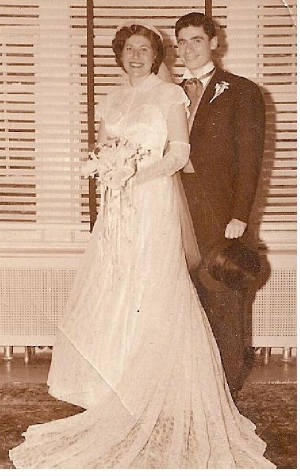
I can only surmise this related in some part to lingering qualms he had about my brother having married outside
the Tribe, although my father truly never had anything but nice things to say about my sister-in-law. Sadly, he didn’t
live to see any of his grandchildren become bar or bat mitzvah, as all four did in due time.
I don’t remember what, if
anything, I replied to him at the time. But if I could go back, I know what I’d say now. “You’re so wrong,”
I’d tell him. Our relocating probably was the right move, after all. I can only begin to imagine how I’d have
managed without that early exposure to “the real world.” After all, I still grew up to be NiceJewishMom.com. And
nearly 50 years after being transplanted, I still struggle at times with assimilation. Why, my family and I have had several
culture clashes in the last week or two alone.
As I briefly alluded to last week, I had to attend a funeral after the mother of a good friend died.
I still can’t quite believe sometimes that I hang out regularly with Catherine, whose husband, Jaimoe, will receive
a special Grammy Award in L.A. next month, along with all of the other remaining original members of the Allman Brothers Band.
(When I was in college, ABB was the No. 1 group in the country, and everyone would storm the dance floor at the opening strains
of “Sweet Melissa” or “Ramblin’ Man.”)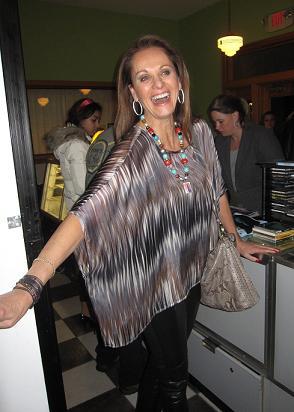
Then again, Catherine is an incredibly accomplished woman in her own right. A gifted dancer and longtime
chair of the Dance Department at Central Connecticut State University, she is talented, dynamic, and eternally glamorous,
not to mention a great mother and friend. So when her mother passed away on Jan. 19, there was no question I’d go to
the service, held at a church in Mystic, CT, about a 90-minute drive away.
I first met Catherine through my
good friend Stacey, a fellow Jew, and we both soon found ourselves perplexed over how to best pay our respects. There was
a wake the night before and an early morning funeral. Did it matter which of these we attended? Or were we expected to appear
at both? Stacey opted for the wake, since she’s a high school teacher and her husband's a judge, and
it was hard for them to miss work. Judging from my Jewish experience, I assumed it was more crucial to attend the funeral.
But that meant that I’d have to drive all the way there and back, quite a schlep, alone.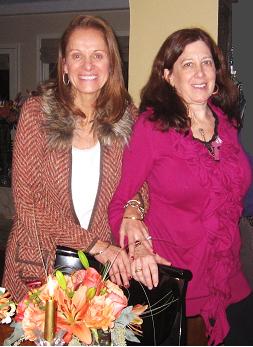
It only compounded my mounting trepidation when I employed the Siri feature on my new iPhone 4S to locate
the church, and it responded with a complex set of directions that included 20 steps. But I carefully copied them down, then
woke up much earlier than I ever do and got on the road early. And with luck, I rounded the final bend almost on time -- just
a few minutes past 10 a.m. -- only to see that there was no church in sight. Anywhere.
With luck, a mail truck pulled
up nearby just at that moment. I parked and ran across the street frantically to consult its driver and explain the nature
of my mission. The mailman shook his head sympathetically, then informed me that my new pal Siri had essentially sent me to
the wrong city. Although we were technically in Mystic, CT, this part was the quaint village of Stonington, and the church
that I sought was in downtown Mystic, across a bridge and many miles away down narrow country roads.
I stared at him in disbelief. Then I began to cry. The funeral was presumably already under way. I had no
idea how to get there. And judging from the short duration of most Jewish funerals, it was likely that I’d risen
at the crack of dawn, gotten dressed in black and driven 90 minutes for no purpose. I was going to disappoint my dear friend
and miss the entire thing.
Siri took this opportunity to tell me that the remote fishing village to which I had just journeyed
was not a Wifi zone, so its GPS services were unavailable here. The mailman pointed me in the right direction, but soon enough,
utterly lost again, I pulled over and tried Siri once more. Now it said that there was no St. Patrick’s church in Mystic
and proceeded to list several dozen other churches nearby. Which one of those did I want? St. Thomas, St. Paul, St. Bridget,
St. Clare?
OK, seriously. Is there anywhere in America where there are several dozen temples in close proximity, let
alone in or near a remote New England fishing village?
Desperate, I simply asked it for directions to downtown Mystic, and then proceeded to follow another complex
route, driving for miles up and down precariously twisting roads in mountainous terrain. Finally, I pulled into the downtown
area and located East Main Street, only to see numerous steeples within a few blocks. Which one, if any of these, did I want?
I pulled over and began to run madly, when suddenly I saw a hearse parked way up the street and a white wreath with
streaming ribbons mounted on a door. Thank the Lord – well, someone’s Lord.
I bounded up the church steps and pried open the heavy wooden double doors. By now it was just past 10:35,
and I expected to walk in just in time to hear a closing hymn.
Not quite.
The cavernous sanctuary was packed
with people and nearly every single pew occupied for the Catholic mass that was well underway and nowhere near being over.
As unobtrusively as possible, I found myself a seat in the back beside two young blondes.
To my enormous relief, I spied
Catherine seated way up front and surmised that I hadn’t blown this entire effort after all. Then, to my discomfort,
I heard the minister ask everyone to kneel and say a prayer and watched as the people around me complied instantly, sinking
to their knees on the low padded platforms placed inside every pew. This proceeded to happen repeatedly. What was I supposed
to do?
When in Rome, you do as the… Well, you know. When in temple, I certainly expect everyone present,
Jewish or not, to rise when the Torah is removed from the ark and key prayers are recited. And so every time the minister
entreated all present to stand, I complied. But to kneel? In church? Wasn’t that, in essence, kneeling to Jesus Christ?
I was tempted to ask the young women beside me whether or not I’d missed what I deemed to be the main event, the eulogies. But I felt like my lack of compliance
in the on-your-knees department already was attracting enough sidelong glances. So I chose to keep mum and wait. And wait.
Now the minister was summoning everyone to step forward to receive Communion, and upwards of 200 people slowly lined up, one
by one, to receive a pale wafer from his hand. All the while, a woman who was for all intents and purposes a cantor sang the
same verse over and over again for about 20 minutes to the voluble strains of the organ. beside me whether or not I’d missed what I deemed to be the main event, the eulogies. But I felt like my lack of compliance
in the on-your-knees department already was attracting enough sidelong glances. So I chose to keep mum and wait. And wait.
Now the minister was summoning everyone to step forward to receive Communion, and upwards of 200 people slowly lined up, one
by one, to receive a pale wafer from his hand. All the while, a woman who was for all intents and purposes a cantor sang the
same verse over and over again for about 20 minutes to the voluble strains of the organ.
That verse went something like
this: “He who eats my flesh and drinks my blood lives in me, and I live in him…” I’d only been in
church for a wedding or two and heard pretty things like "With this ring, I thee wed," and "You may now kiss
the bride." Now I thought, “Yikes!”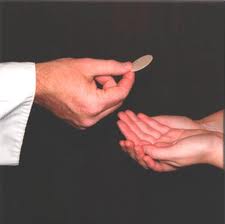
And for the first time I realized just how uncomfortable and out of place my various Gentile friends must
have felt when they attended my children’s simchas and my own parents’ funerals.
Also, with a twinge of shame, I
realized that Siri hadn’t done me such a grave disservice (excuse the pun) after all. Although she’d sent me on
a hair-raising wild goose chase – make that a wild church chase – in the end all she’d done was spare me
an extra half-hour of acute uneasiness. Because after the eulogy, which I soon got to hear and which was crafted skillfully
with both heartfelt emotion and humor by one of Catherine’s nephews, I was able to hug my friend outside and show her
I’d made the effort to show up, which is the reason I’d gone in the first place.
(And please believe me, I am not making light in any way of my friend having lost her mother. I've lost a mother. I miss
my mother. I miss my mother every day. As I told Catherine when I saw her and expressed how sorry I was, "This is
probably the worst thing you'll ever have to go through. At least I hope that it is.")
Then followed some continued confusion
about how to behave at the cemetery. (No one in sight was saying Kaddish… and after I returned to my car at
the conclusion of the service, I saw that everyone else present had lingered to remove flowers from the many filled vases
surrounding the grave and heap them onto the casket. Who knew?)
The minister had announced that the family would
be receiving friends and family at a public location down the road. So I drove over to fully pay my respects, only to find
everyone lined up for lunch. And there, at last, was my common cultural denominator. Catholic or Jewish, in the end we all
had the same instinct: Life can be hard. Let’s eat!
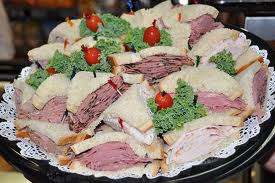
My poor son Aidan, meanwhile, continues to struggle to find such common ground.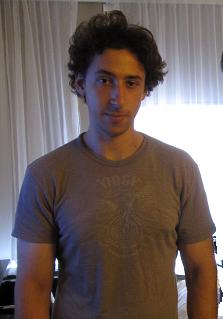
When he enrolled in graduate school last fall, he already had some misgivings. Having worked for over three
years after finishing college, it was tough to become a mere student again. Yet as an aspiring screenwriter, he’d been
advised repeatedly to get an advanced degree after landing plenty of production work in TV and film, but none that involved
any actual writing.
Then he'd read about The TV Writers Studio, a new Master’s degree program in writing and producing
for television created by a haimishe Hollywood veteran named Norman Steinberg, who'd collaborated with Mel Brooks
on Blazing Saddles, been a show-runner for Cosby, and authored the screenplay for the 1982 hit comedy
My Favorite Year, starring Peter O’Toole. Although affiliated with Long Island University, the program was
based in Brooklyn, a convenient subway ride from Aidan’s apartment in Chelsea.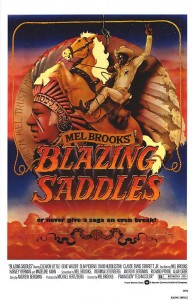
Aidan emailed Steinberg, who responded by phoning him almost immediately. Then, at his encouragement, he
submitted some writing samples and an application, and he was accepted within a week. He had some doubts about enrolling in
relatively accessible LIU after his far loftier Ivy League experience as an undergraduate at Brown. To his relief, though,
he discovered in September that the vast majority of his classmates were surprisingly focused and fairly capable.
Unfortunately, classes brought
no further contact with Mr. Steinberg himself. One of Aidan’s professors was another Hollywood elder statesman, a Jewish
fellow whose claim to fame was creating the popular 70’s sitcom Sanford & Son. This man seemed to embrace Aidan as a protégé and find
everything he wrote or said hilarious. His main teacher, however, was a prototypical WASP who didn’t get his humor at
all. popular 70’s sitcom Sanford & Son. This man seemed to embrace Aidan as a protégé and find
everything he wrote or said hilarious. His main teacher, however, was a prototypical WASP who didn’t get his humor at
all.
It seemed like an instant replay of the time he took a course in sketch comedy writing at a popular Manhattan
improv club called the Upright Citizens Brigade, only to discover on the very first night that his teacher and classmates
were all non-Jews whose outlooks and tastes were so dissimilar to his that they didn’t like Woody Allen.
But this time around was a much bigger deal. He was enrolled for the next two years and paying hefty tuition,
for actual college credit.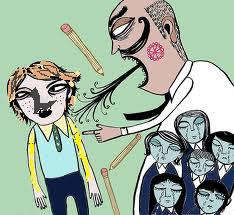
Aidan found himself feeling like a misfit in class, marginalized and misunderstood. He typically sat beside the only other
Jewish guy enrolled, as if seeking some shred of moral support, seething inwardly as his glib and self-assured professor invariably
gave short shrift to his comments. This was especially unnerving because Aidan was the only published writer in the class,
and the only one with any industry experience, having done stints on many films and virtually every TV show that shoots in
New York. “He pays much more attention to the girl who’s been working as a bartender for the past two years,”
he lamented.
Then, last week, this professor finally added actual injury to this insult. First-semester grades came out,
based strictly on class participation, since there had yet to be any graded assignments. Aidan’s always been an A student.
The guy gave him a B+.
When he called me to kvetch, I echoed his indignation, then cut right to the chase,
venturing a theory not far off from what my own mother would have offered. “Honey, it’s not your fault,”
I assured him. “It’s just that he’s a WASP and you’re a Jew. Chances are he’ll never really
get you, and frankly, there’s almost nothing you can do about it.”
When he made no attempt to argue,
I must confess to adding in a commercial. “That’s why you should be dating Jewish girls,” I said. “They’ll
get everything you say.”
On further consideration, though, I began urging him to do something outside of class
to help the professor get to know him better or otherwise ingratiate himself. The guy had no idea that Aidan was a music critic,
published weekly in The Village Voice. Why not send him one of his reviews?
Aidan, like me, is the opposite
of a self-promoter, though. He adamantly refused.
Now I was the one who was seething with frustration. Until this
past Tuesday, that is.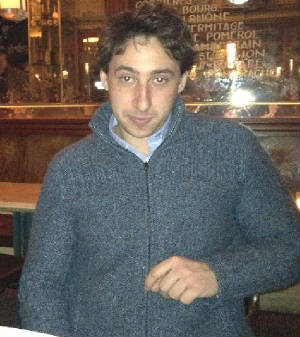
Aidan needed to visit the main campus to sign some registration forms for the new semester and asked the
professor for a ride over, knowing he drove there during lunch. En route, the professor asked if he’d given any thought
to the script he’d been assigned to write over the impending semester.
Aidan replied that in keeping with
the professor’s advice to capitalize on his own area of expertise, he was going to write about being a journalist.
“Huh?” the man responded, although Aidan actually had alluded to this subject in class many times before.
My son proceeded to relate to him how he’d been a beat reporter at the newspaper where my husband works
one summer during college and had been assigned to a town, covering everything from local politics and school-board meetings to
police proceedings. And then, ever since graduating college, he’d been writing regularly about jazz for JazzTimes
magazine and The Voice, and more recently reviewing rock music as well. Given his modesty, he neglected to mention
the handful of stories he’s had published in The New York Times. But he offered to forward his latest
review, about a concert by a group called Caveman, from last week’s Voice, in which he’d quoted an LIU
classmate. It read, in part, like this:
“Caveman played in front of video projection of a menacing skull and the band's
name emblazoned in a way reminiscent of an Argento film, an aesthetic better suited to Megadeth or Mastodon; the backdrop
suggested that perhaps the skull belonged to poor Yorick, or to the fossilized remains of Cro-Magnon Man, that ill-fated troglodyte
with a penchant for artistic self-expression. The projection then drifted to a voyeuristic view of a suburban home and migrated
outside, the band silhouetted against a bramble of ferns, even though the most obvious habitat for this group is the basement.
Though the stylistic trees in this narrative never gave way to any real caves—the metaphor extends about as far as the
distortion pedal—the cavalier attitude went a long way to resuscitating a sleepy audience from the January doldrums.”
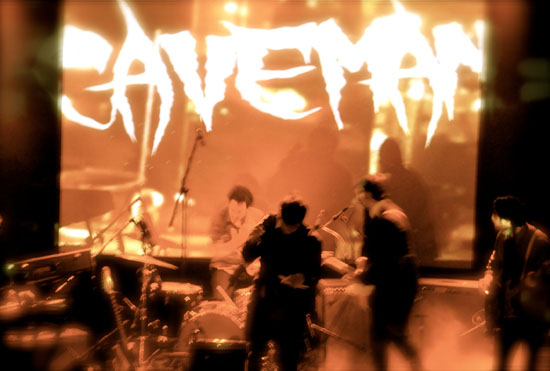
Aidan did forward that story, and the professor wrote back instantly thanking him. Perhaps he actually read
it. He still won’t get his sense of humor, of course. But maybe now he'll see him in a more favorable light and Aidan
will get the respect he deserves... or maybe even that A.
And perhaps
this small sample of my son’s own penchant for self-expression will help bridge what remains, in 2012, a still-gigantic Jew
versus Gentile gap.
And lest you think I’m casting any aspersions, let me assure you that some of my best friends are NOT
Jews. Which leads me to my last example of miscommunication, one which demonstrates that the bewilderment between the cultures
can cut both ways.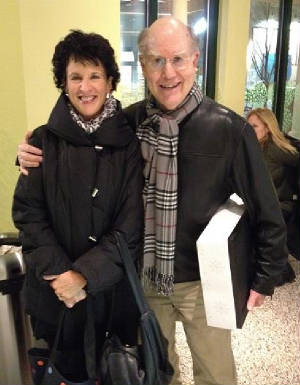
When Nice Jewish Dad and I were first married, we became close to one of his former Princeton classmates
and his wife, an alliance only heightened when we produced two pairs of offspring almost exactly the same age. Living
in different towns, we gradually lost touch in the ensuing years as our kids entered different schools. Then, about four years
ago or so, we ran into them at a party as empty nesters and picked up right where we’d left off.
Dial, the husband, is a native
Southerner and lapsed Baptist, or some such Christian persuasion. Sally is a New England-born-and-bred WASP. But with
a lifelong curiosity and passion for art, books, theater and all things cultural, they are far more fun, adventuresome and
compatible with us than many of our Semitic friends.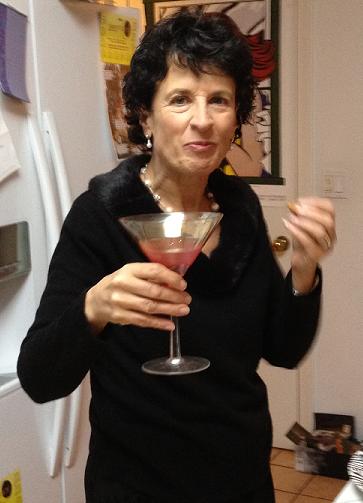
Oddly enough, they also evince far more interest in the Purim lyrics I write than any Jews I know. So when several cast
members of my temple’s spiel dropped out this year for personal reasons, I deigned to ask Sally, an avid singer and Broadway
buff, if she wanted to join the cast.
“Really? I’d love to!” she replied without the slightest
hesitation, not missing a beat.
She admitted to having some second thoughts the following morning, due to the many
other commitments that consume her life. But she showed up for the next rehearsal anyway, having been assured by me that no
one, including our clergy, would object, and that no intimate knowledge of Jewish holidays or practices was required.
I soon turned out to be terribly wrong on at least one of those counts.
Our cantor welcomed Sally warmly,
and no one else inquired about her religious affiliation or appeared to bat an eyelash. But when we reached the grand finale
I’d written (reconfiguring Gloria Gaynor’s inimitable disco anthem, “I Will Survive” as the ultimate
Jewish pride song, now entitled “We Will Survive”), it quickly became apparent that, as they say, “Houston,
we have a problem.”
Sally kept leaning over to me to ask apologetically how to pronounce various terms. “How do you say
this?” she inquired, pointing to a line about mishloach manot, the gift baskets Jews send to each other on
Purim. “And this?” she asked of the word siddur (Hebrew for “prayer book”). Then came a series
of even more challenging tongue-twisters: tzedakah (charity), chupah (wedding canopy), sechel (common
sense), and schmaltz (rendered chicken fat, although it really means so much more than that).
Clearly, it wasn’t just the
pronunciations that were mystifying her. She had no idea what most of these words meant. My heart sank. It may sound
crazy, but not until that moment had I recognized the extent to which my spiel was so... so... Jewish.
No doubt she’d beg off graciously before the next rehearsal rolled around.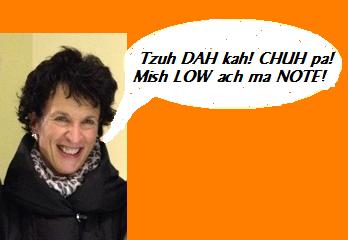
Au contraire. As a language teacher at Berlitz – not to mention an all-around mensch –
Sally remained undaunted and undeterred. She came back the next week having written phonetic transliterations beside every
challenging phrase. By the following week, she'd mastered every single syllable, having practiced exhaustively for
her husband during a long drive to visit old friends.
“My friends just couldn’t believe I knew all of that!”
she exclaimed, so proud that she was visibly kvelling (yet another term I had to translate for her when the
cantor dropped it during a rehearsal). “Tu B’Shevat…the Sh’ma…shaking the
lulav on Sukkot… They were very impressed!”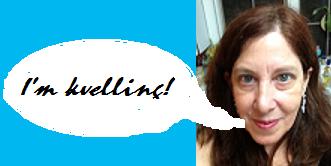
“The friends you were visiting are Jewish?” I asked, just a little surprised.
“No,” Sally said with a laugh. “They’re WASPs. But they were still impressed.”
Ditto, I’d have to say.
Yes, maybe the discomfort and lack of comprehension do cut both ways.
The fact is, unlike my parents, I feel no raging urge to assimilate. Even if it leads to occasional awkward moments,
I'm proud of who I am. Besides, socializing with non-Jews doesn't make me in any conceivable way less Jewish. If anything,
it crystalizes my awareness of how often I pepper my conversation with Yiddish expressions and reminds me just
how Jewish I am.
Ironically, despite my family's dramatic move across state
and cultural lines, my folks continued to socialize almost exclusively with relatives or people they'd met at temple.
Similarly, despite all of the attention paid in the media to multi-culturalism, my generation's social divides seem
to have persisted into the 21st century. But I'm pleased and proud to have progressed a little beyond that, no doubt in
no small part thanks to my parents' having dared to venture forth.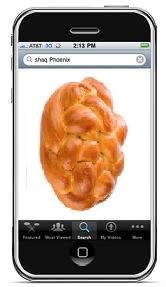
As for Siri, just this afternoon I decided to give its services a second chance. “Where can I buy a
challah?” I asked, just putting it to the test. (Obviously, I already knew where.)
“I didn’t quite get
that,” its perky feminine voice responded, giving one of its stock default replies.
“Where can I buy a challah?”
I repeated.
Misperceiving the word, she proceeded to give me directions to nine different businesses, including Halle
Drywall Specialists, Halle’s Kitchen & Bath, and Les Halles, one of my favorite French restaurants in New York.
Something was clearly lost in translation.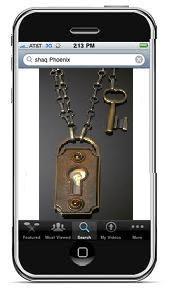
“Never mind,” I told her. “Where can I buy some lox?”
This time there was no hesitation.
“I found 20 locksmiths,” she replied cheerily, “…19 of them are fairly close to you.”
Oy. Gut in himmel.
Sorry, Siri. You may or may not become my new best friend. But you are
definitely not a Jew.
|
|
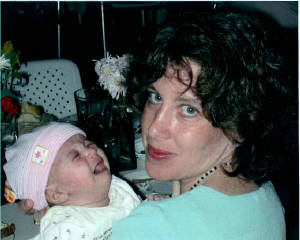
|
| That's me. The redhead on the right. But that is NOT my baby. |
No, sir, that's not
my baby. How could any mother smile beatifically while her own child wailed? Never mind that neither of my offspring
ever cried so plaintively, as far as I recall (not while I was there to nurture them through their every perceptible
need... although my son still complains that I often dressed him in garish and girlish color schemes, scarring him FOR LIFE). Besides, I'm distinctly beyond prime
delivery age ("Kitchen's closed!" as my mother might say), and my kids had departed the diaper stage by the
dawn of the Clinton Administration. Now in
their 20s, both are currently living on their
own, in not-too-distant cities, although each manages to phone me daily. In fact, to be exact, several times a
day, then sometimes text me, too. (That may sound excessive, and emotionally regressive, but I subscribe to
the Jewish mother's creed when it comes to conversing with kinder: Too much is never enough.)
Two demanding decades spent raising two kids who are kind, highly productive and multi-talented, who generally
wear clean underwear (as far as I can tell), and who by all visible signs don't detest me are my main credentials
for daring to dole out advice in the motherhood department.
Presenting myself as an authority on all matters Jewish may be trickier to justify. Yes, I was raised Jewish and am biologically an unadulterated, undisputable, purebred Yiddisheh
mama. I'm known for making a melt-in-your-mouth brisket, not to mention the world's airiest matzah
balls this side of Brooklyn. My longtime avocation is writing lyrics for Purim shpiels based on popular Broadway productions,
from "South Pers-cific" to "The Zion Queen." Then again, I'm no rabbi or Talmudic scholar. I
can't even sing "Hatikvah" or recite the Birkat Hamazon. Raised resoundingly Reform, I don't keep kosher, can
barely curse in Yiddish, and haven't set foot in Israel since I was a zaftig teen. Even so, as a longtime writer and ever-active
mother, I think I have something to say about being Jewish and a mom in these manic and maternally challenging
times. I hope something I say means something to you. Welcome to my nice Jewish world!
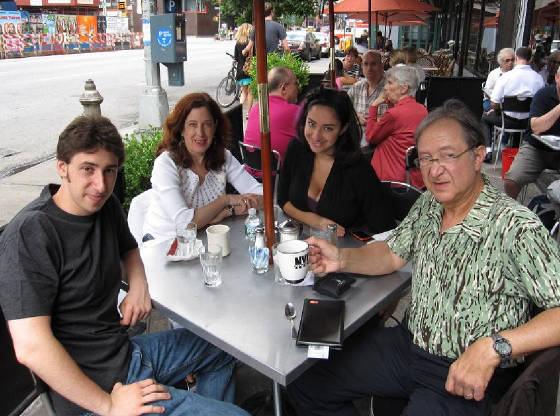
|
| LEVYS! MEET THE LEVYS! WE'RE A MODERN JEWISH FAMILY... |
In coming weeks, I will continue
posting more personal observations, rants, and even recipes (Jewish and otherwise). So keep reading, come back often,
and please tell all of your friends, Facebook buddies, and everyone else you know that NiceJewishMom.com is THE BOMB!
********************************************* The family that eats together (and maybe even Tweets together):
That's my son Aidan, me, my daughter Allegra, and Harlan, my husband for more than 26 years, all out for Sunday brunch on a nice summer weekend in New
York.

|